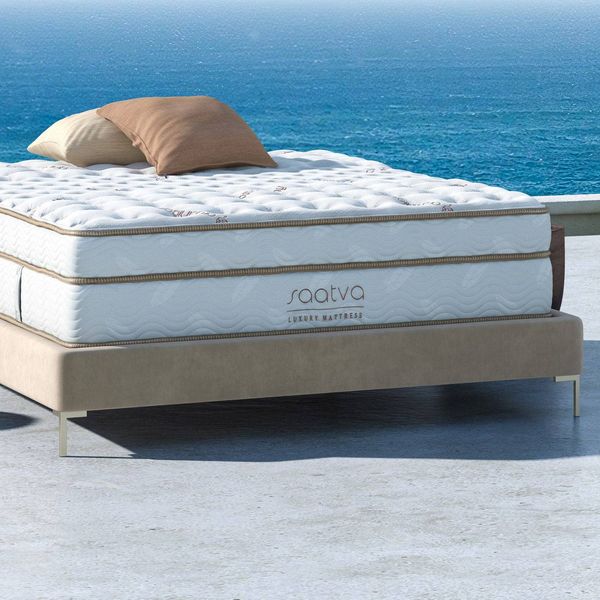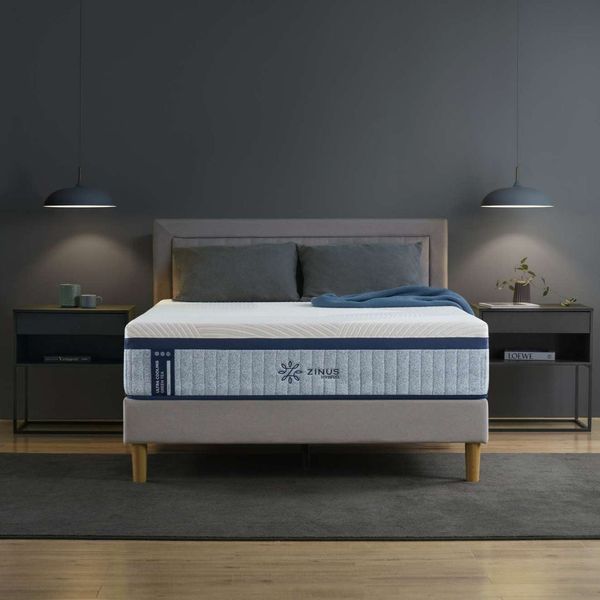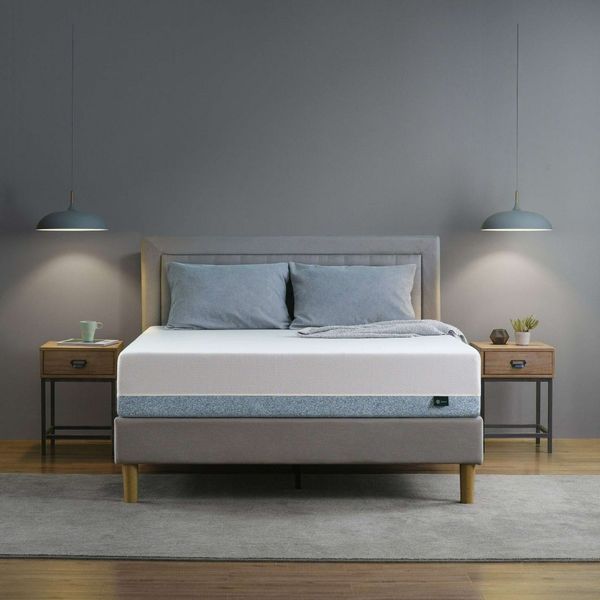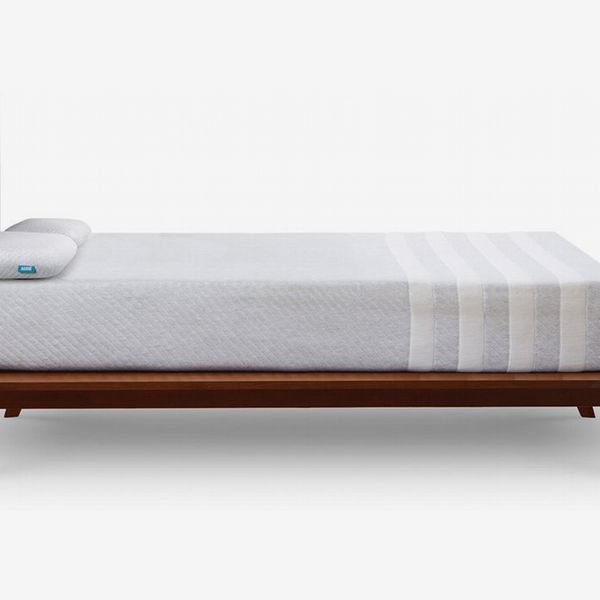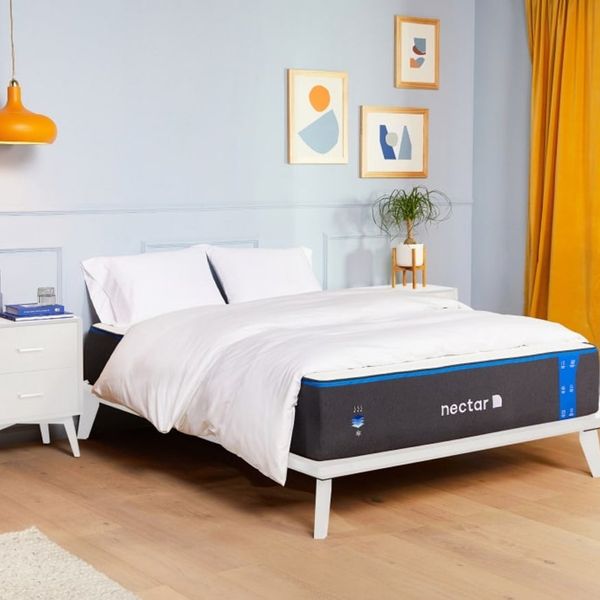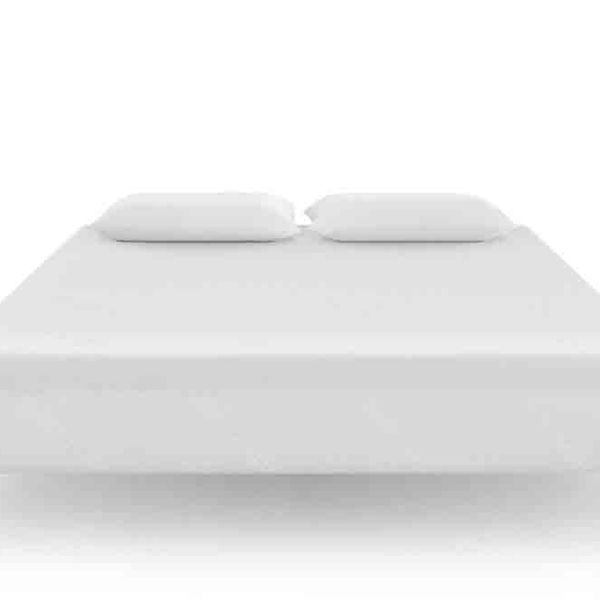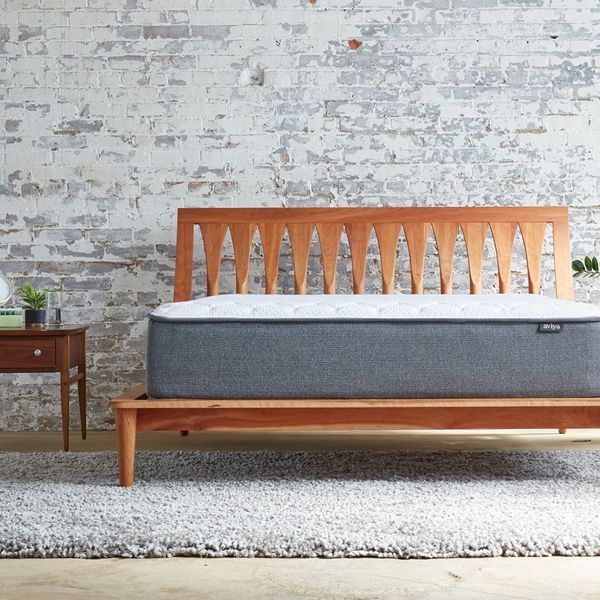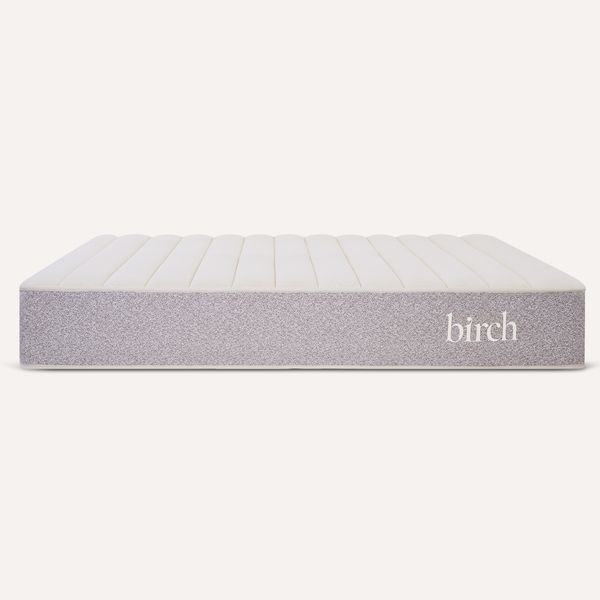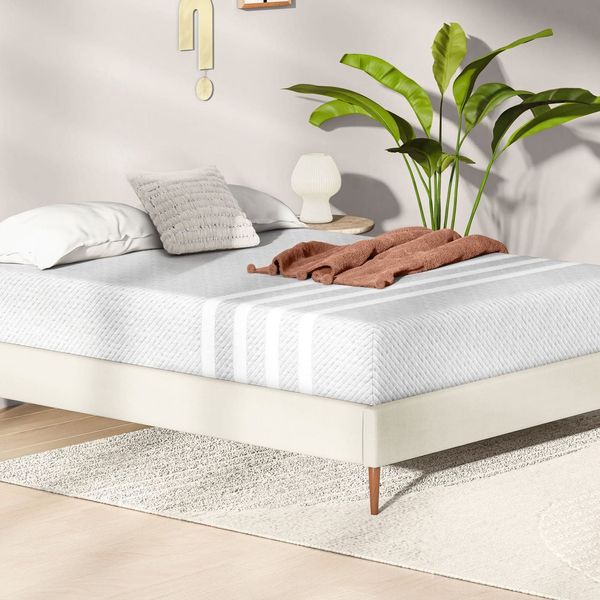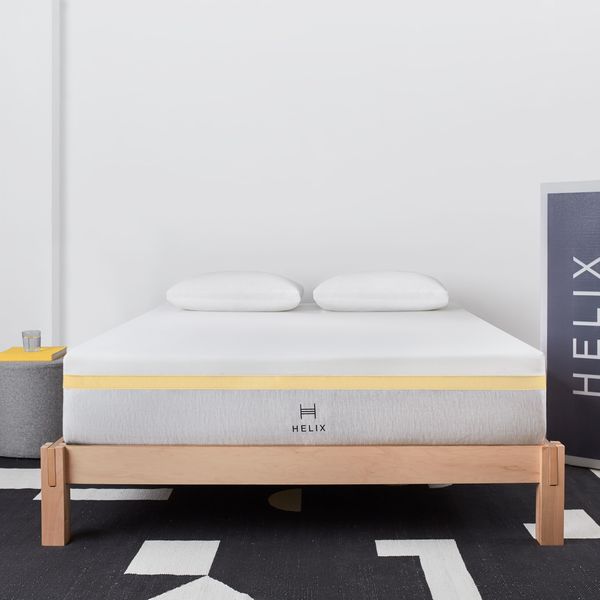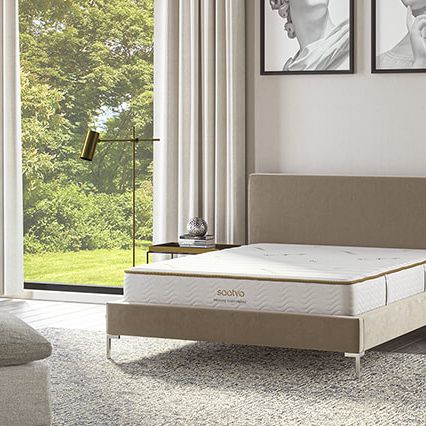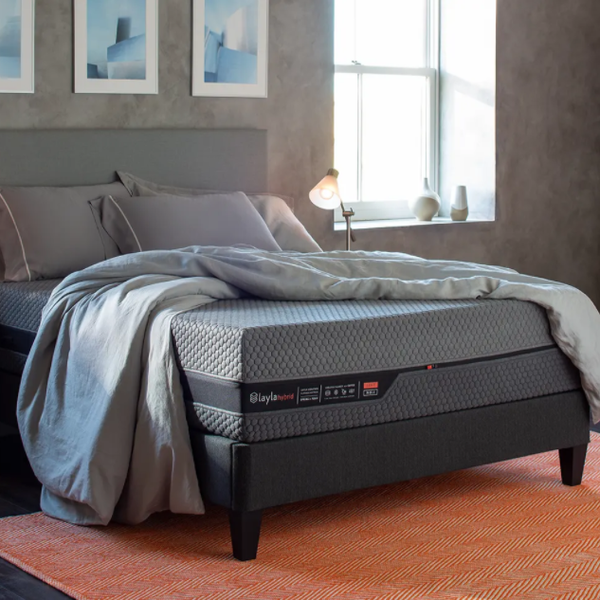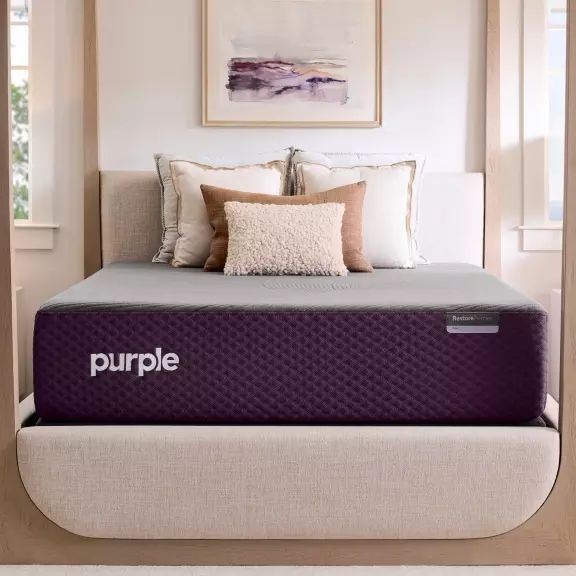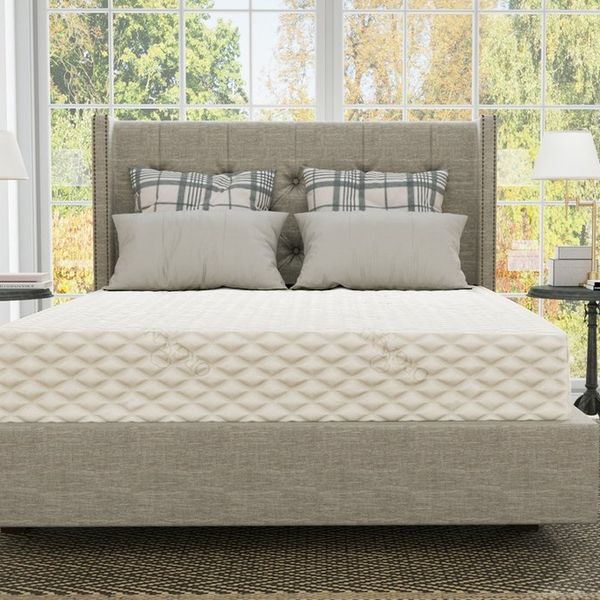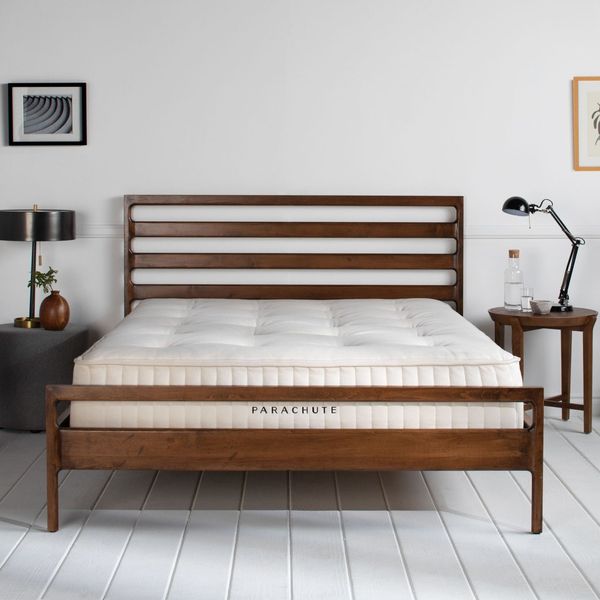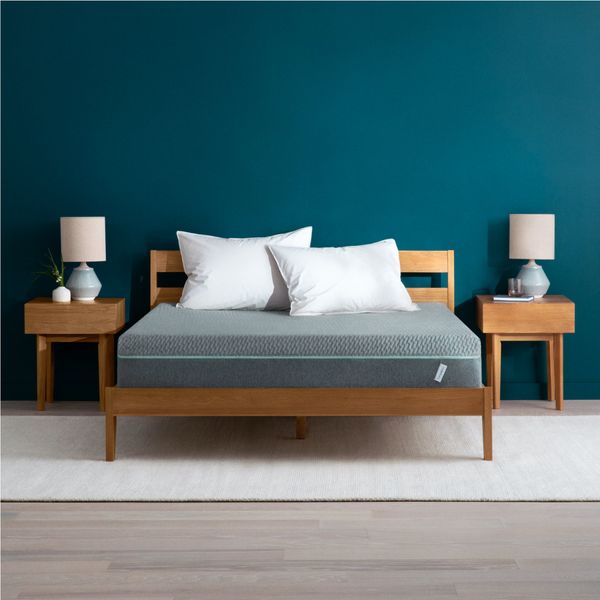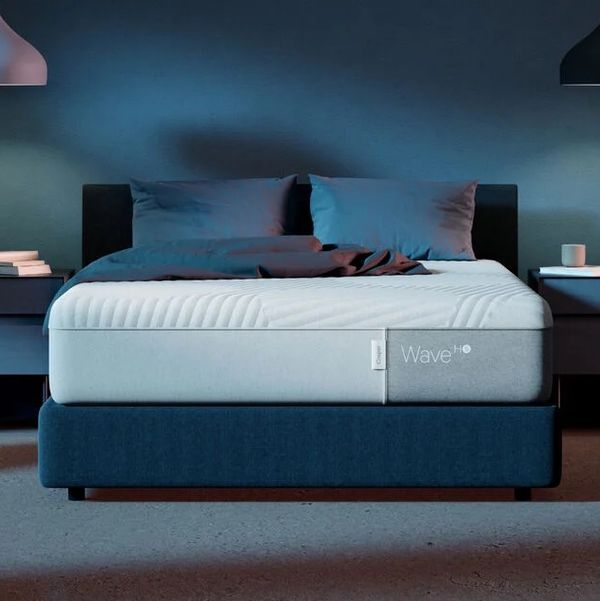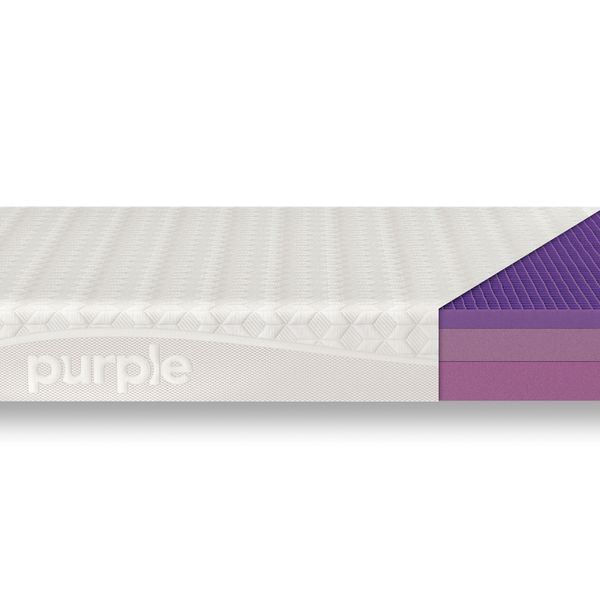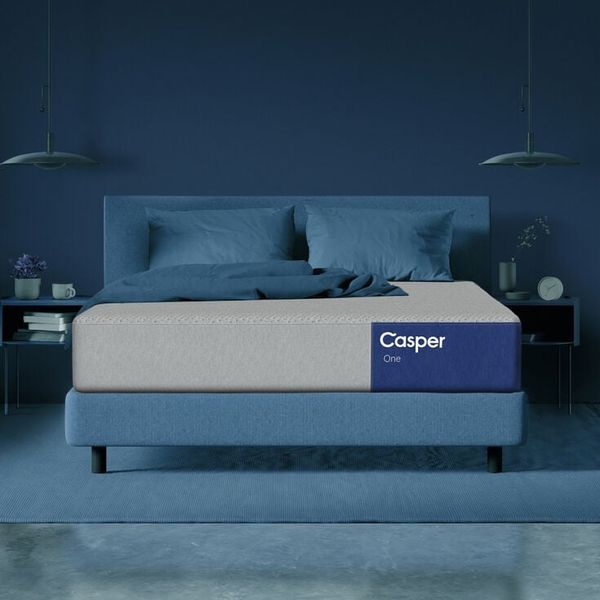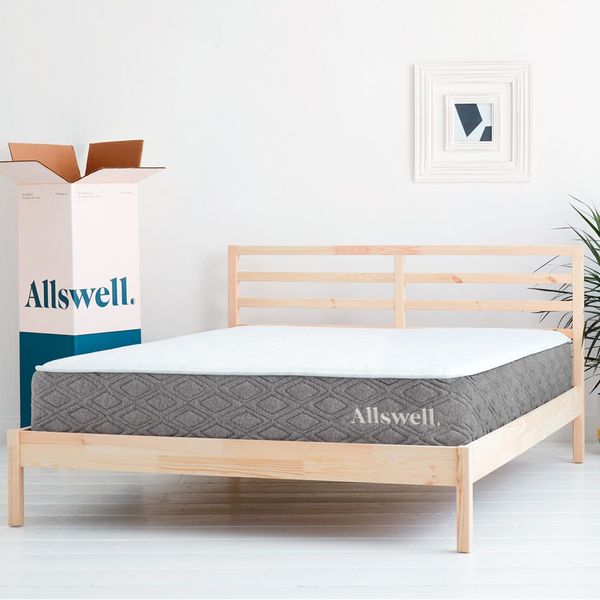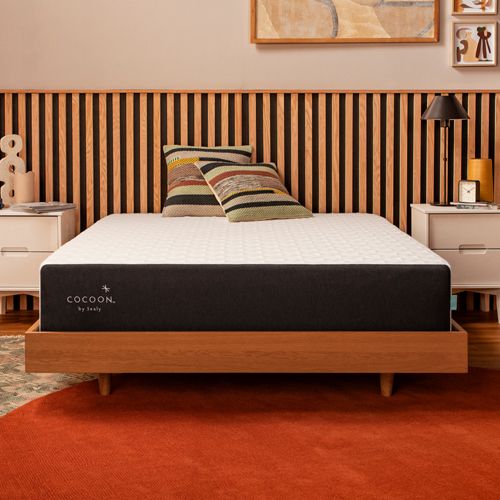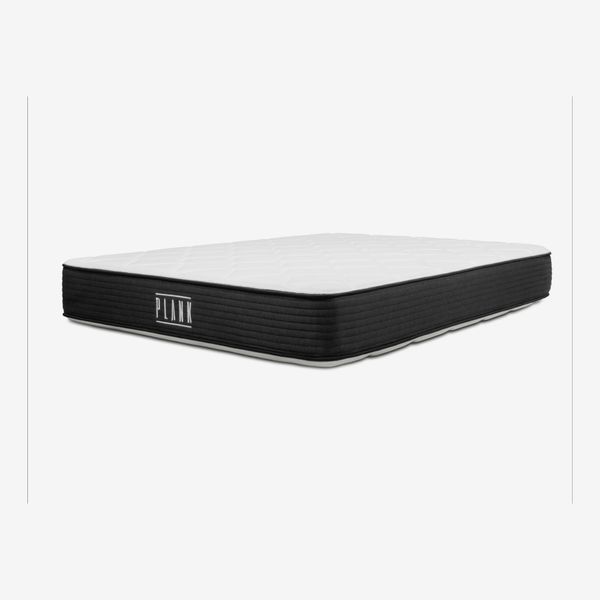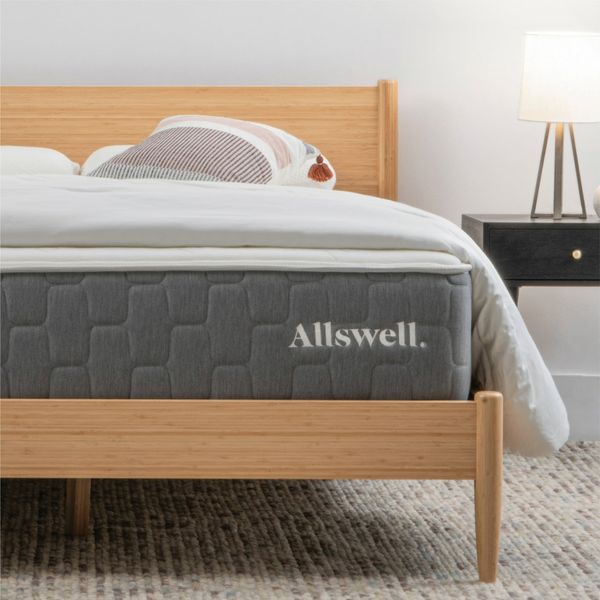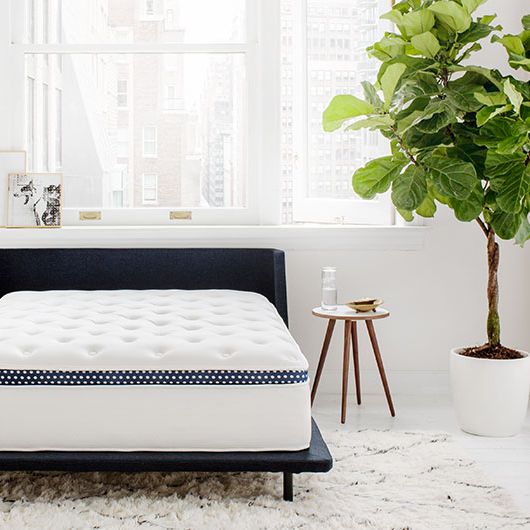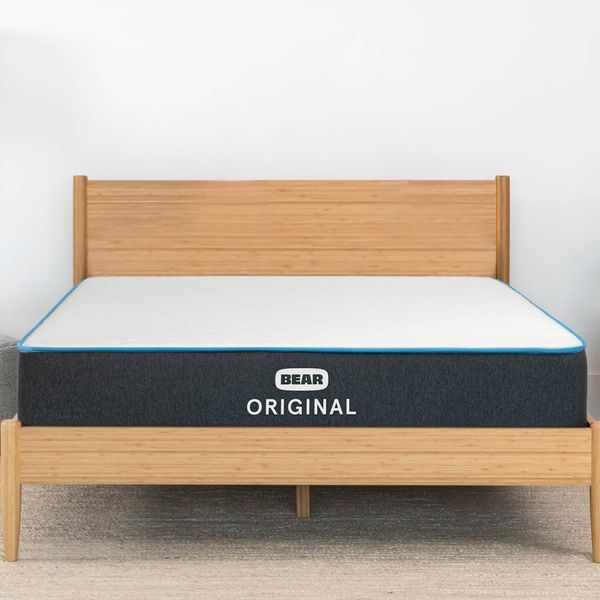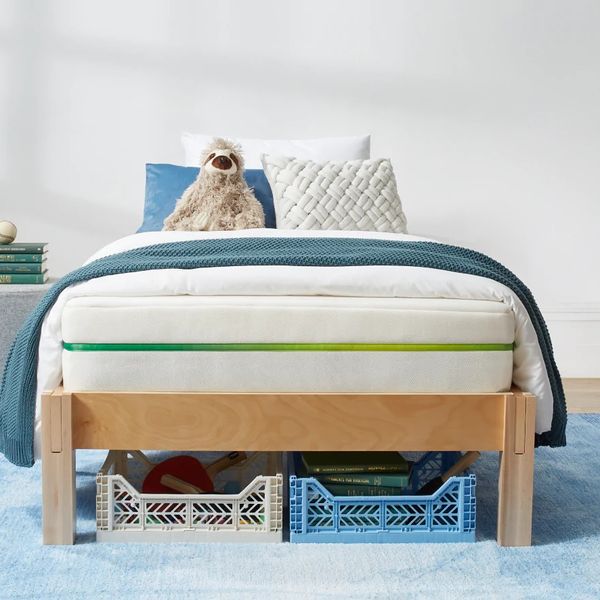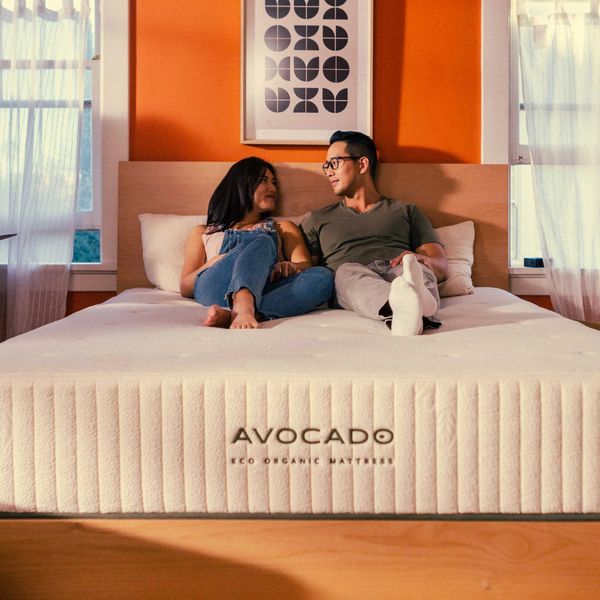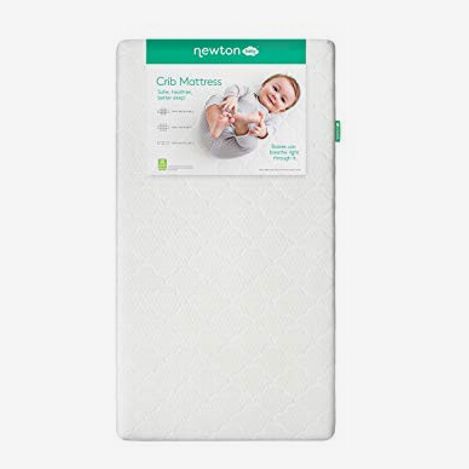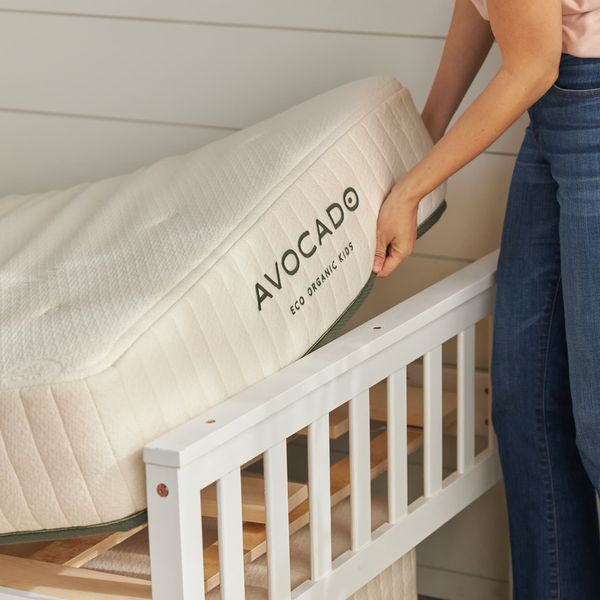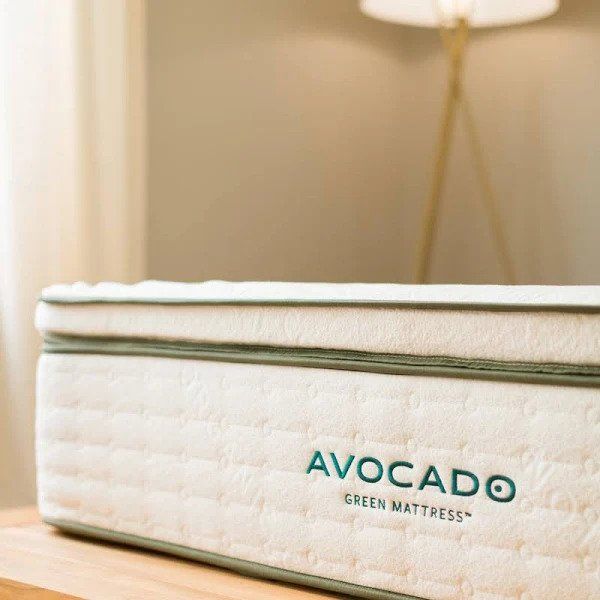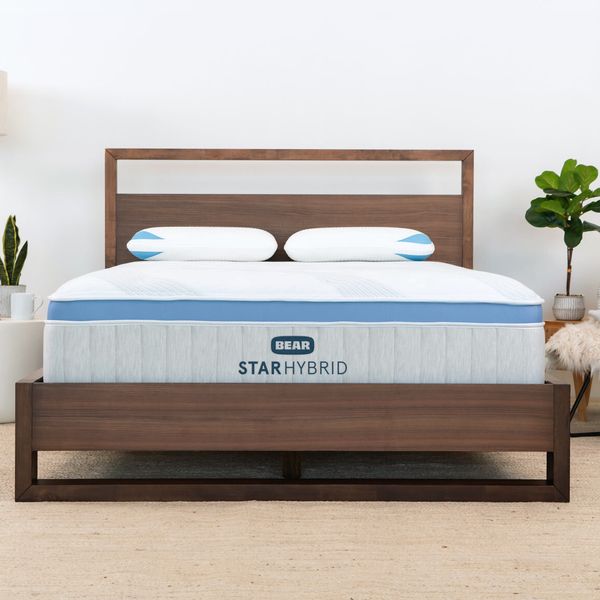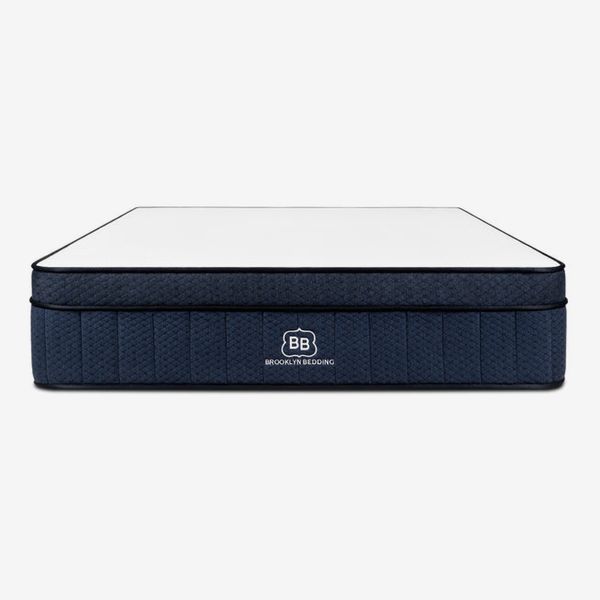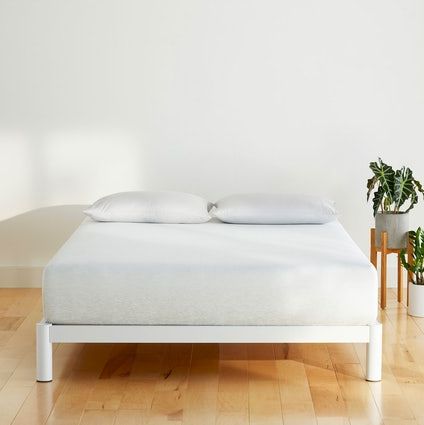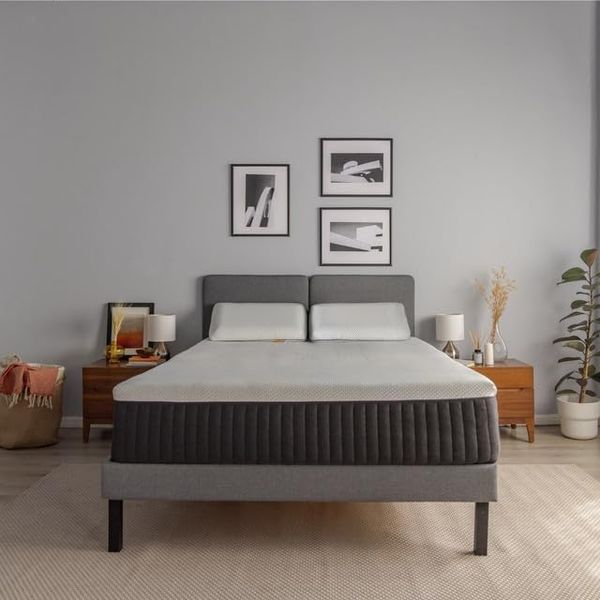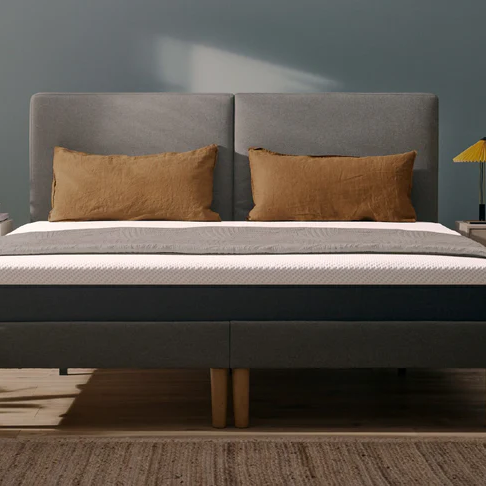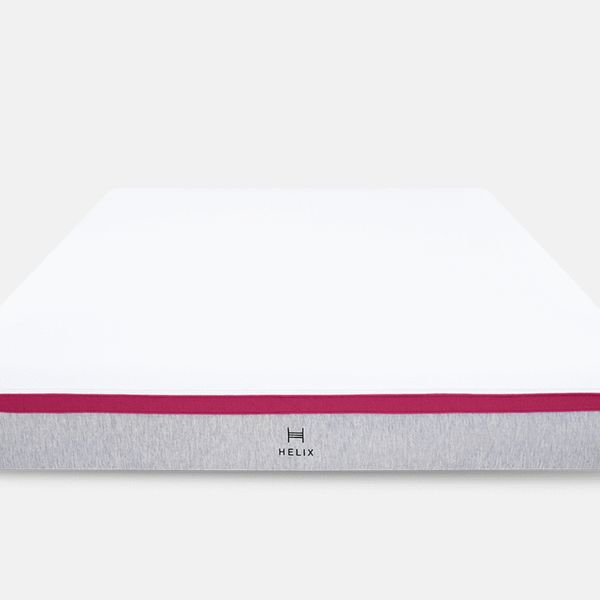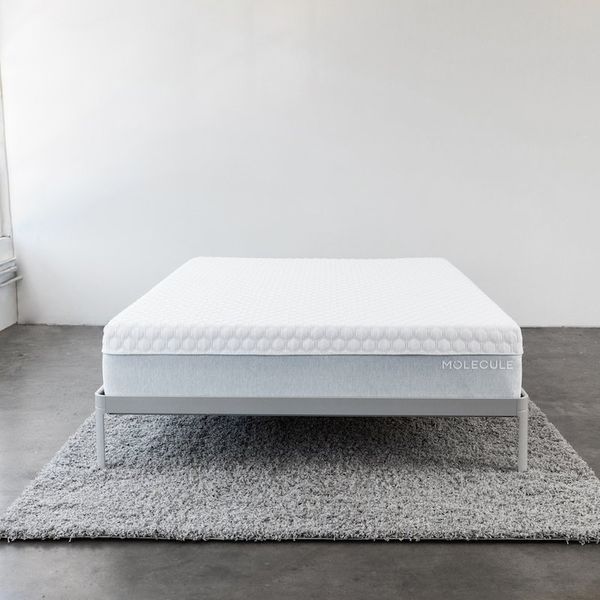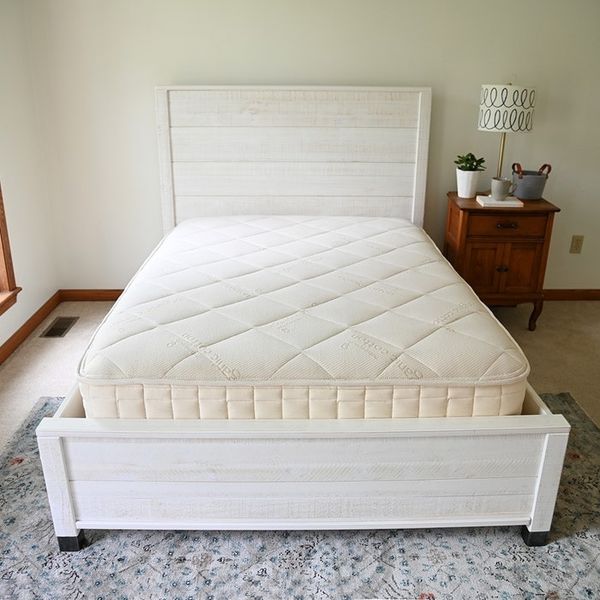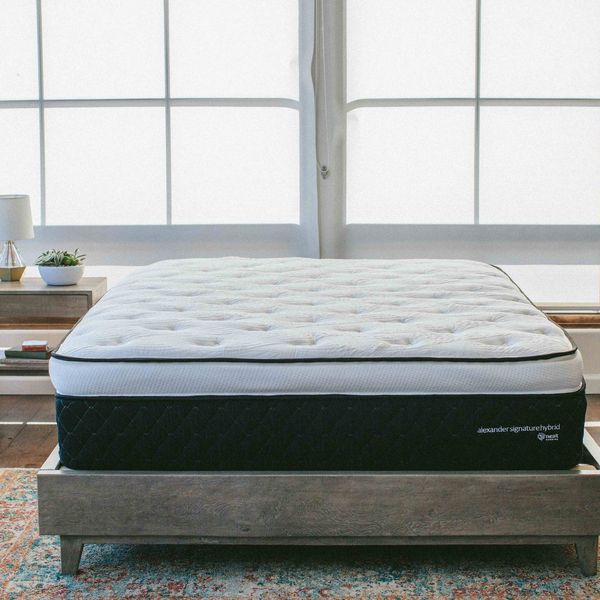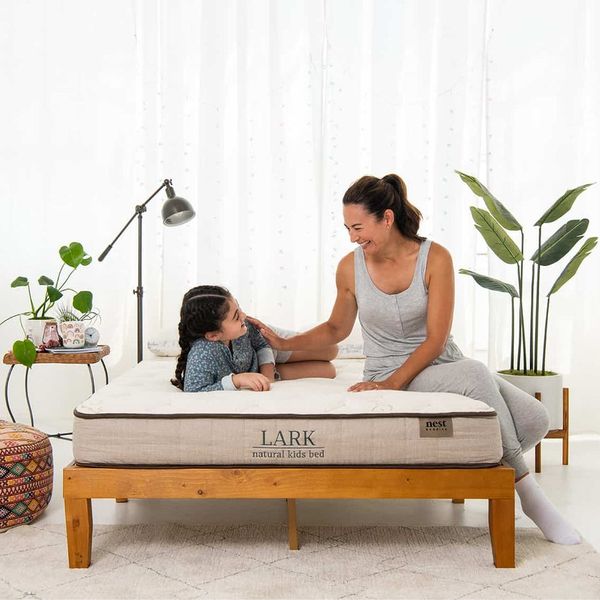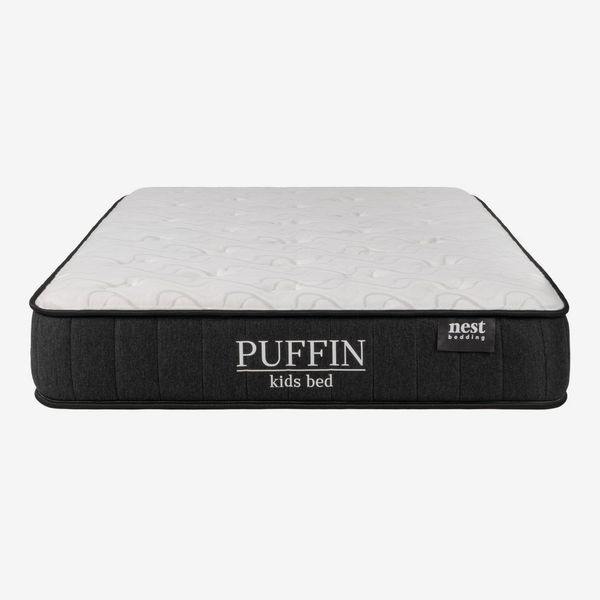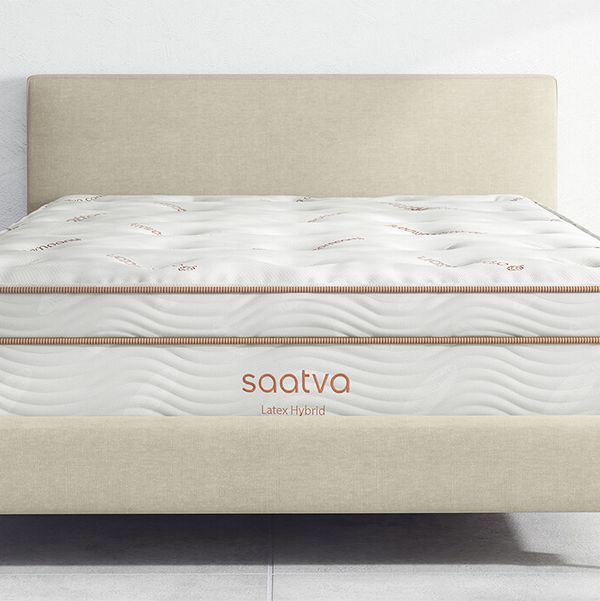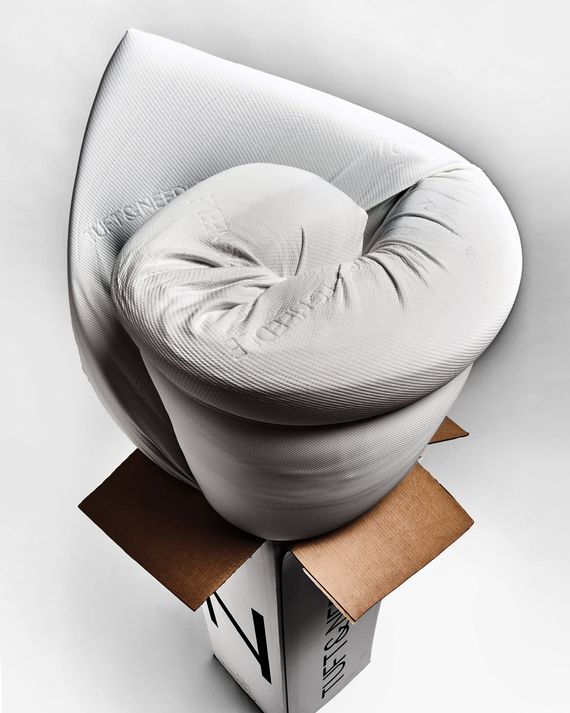
Buying a mattress online has become a new normal, even if it seems counterintuitive to make such a big and important purchase — one that could literally make you lose sleep — without trying it first. It’s made the essential question of “What mattress should I buy?” a tricky one to answer, especially because, since the start of the bed-in-a-box revolution, the mattress-sphere has only gotten more crowded. With new brands launching and existing ones rolling out new models almost year-round, it can be hard to tell Saatva from Leesa, or Casper from Zinus.
The bottom line is this: There’s no single “best” mattress out there. That’s because the answer will always depend on you — your sleeping position, whether you run hot or cold, your firmness and materials preferences, and your budget. Often, the perfect mattress only becomes obvious once you’ve actually slept on it. So to help make sense of it all and find the best mattresses in a never-ending sea of them, our staff has been testing them ourselves and making note of how they feel to actually sleep on in real life.
Since 2018, our team has tested around three dozen mattresses, and we’re still going strong, constantly adding new models to our testing queue. Every time we set out to sleep on a new-to-us mattress, we play matchmaker, looking at the materials a mattress is made of and whether it makes any specific claims: Is it supposed to be cooling or offer superior pressure relief? Is it branded as the firmest — or plushest — mattress on the market? Then we survey Strategist staffers, asking a lot of prying questions about how they sleep, what they like and don’t like about their current mattress, and whether they share a bed with any partners or pets.
The idea is to have folks test the mattresses they’d be most likely to buy for themselves, after falling down the mattress-research rabbit hole (which, we assure you, is near bottomless). We ask all of our testers to sleep on each new mattress in their own homes, with their own bedding, for at least a week — though most testers usually spend a month or longer. That way, we can report back on everything from how firm, springy, or cushy a mattress feels to whether it delivers on promises like easing achy joints and stopping you from sweating through your sheets. We also take value into account so that we can weigh in on whether a mattress feels worth its price tag, whether it’s on the more budget-friendly (which we define as under $1,000) or extreme-luxury (which we think of as anything over $2,500) end of the spectrum.
A couple of other things to note: Unless stated otherwise, the starting prices we’ve listed are for queen-size mattresses. In some cases, for companies that offer more than one mattress design, we tested only one option. If you know what type of mattress you want, you can click any of the links in the table of contents to jump ahead — or read on for more details on what we looked for. We’ll be testing more mattresses in the future, but for now, here are our answers to that question about which mattress you should buy.
Update on August 23, 2024: Replaced the Casper Original with the Casper One as the Best Mattress for Side Sleepers and added the Purple RestorePremier Hybrid as the Best Hybrid Mattress for Combination Sleepers; updated prices and checked stock for all products.
In this article
What we’re looking for
Construction
For decades, most mattresses were filled with interlocking, hourglass-shaped springs designed for uniform support across the surface of the mattress, then topped with batting for comfort. Because the springs were all connected, there was a lot of bounciness and motion transfer, and they weren’t especially good for pressure relief. It wasn’t until the 1990s, when Tempur-Pedic first made a mattress using NASA-designed viscoelastic polyurethane foam, a.k.a. memory foam, that there were any big shifts in how mattresses are built.
Today, there is a lot more variety in the mattress landscape. All-foam mattresses abound, as do hybrid mattresses that combine foam and springs. Traditional innerspring constructions have greatly evolved, replacing interlocking springs with “pocketed” steel coils that are individually encased in fabric and can move independently of one another. These pocketed coils are the most common type of springs used in hybrid mattresses, too; the result is better motion isolation, pressure relief, and overall support. Latex and latex hybrid mattresses (which actually had a brief moment in the mid-century before falling out of fashion in the 1970s) have surged in popularity, both for latex’s bouncy, cooling feel, and its eco-friendliness relative to polyurethane foam.
All-foam mattresses often let you sink in a bit more and contour around your body, though foam can vary quite a bit in how soft or firm it is. Foam can also range in quality and durability — look for high-density foams for the most long-lasting material. Hybrid mattresses that layer foam on top of pocketed coils tend to offer more support, thanks to the sturdy coils. But hybrids can also vary a lot in how soft or firm they feel, depending on the thickness, type, and density of the top foam layers, also called “comfort layers.” Some mattresses also have extra lumbar support in the form of strategically placed high-gauge coils across the center of the mattress, or pillow tops, which are basically mattress toppers sewn to the top of the bed (you can think of them as essentially another comfort layer).
We’ve described the construction of each mattress below, and our testers took note of how enveloped or supported they felt; whether a mattress caused them to sleep warmer or cooler than usual; and, in cases of shared sleeping arrangements, whether they could feel partners or pets moving around.
Firmness and Support
Often, manufacturers rate their mattresses on a firmness scale from one to ten, but the way you sleep will have an impact on the type of mattress you find most comfortable and how you experience its firmness. Side sleepers, for example, need pressure relief on their hips and shoulders, along with a mattress that supports the alignment of the spine, shoulders, and pelvis. Back sleepers will do better with a firmer mattress, which helps support the spine, and stomach sleepers often prefer softer mattresses that cradle their body but are not so soft that they sink in too deep.
Sleep Quality
This is arguably the most important factor to consider when buying a mattress, but it’s the hardest to quantify. Some of our writers and editors used sleep trackers or sleep-tracking apps to study their sleep quality. Others have anecdotal evidence, like waking up without an alarm or with less back pain, or never sweating through their sheets.
Best mattress overall
TL;DR: Saatva’s combo of inner springs, memory foam, and a pillow top comes in three different firmness levels, providing options for all sorts of sleepers. In May 2022, the brand increased its trial period to a full year and added a lifetime warranty (to replace its previous 15-year warranty). It boasts one of the best delivery options, with free white-glove service and free removal of your old mattress.
Construction: Saatva, which has been around since 2010, was one of the first online innerspring mattress companies, and though it now makes hybrid and all-foam mattresses, its classic mattress is an innerspring. An organic-cotton pillow top covers a top layer of ecofriendly memory foam, which sits on a level of individually wrapped coils above another layer of recycled-steel coils and a poly foam base. The mattress comes in two heights — 11.5 inches or 14.5 inches — though that shouldn’t affect firmness or support.
Firmness and Support: Saatva offers three firmness levels for its classic mattress: plush soft, luxury firm, and firm.
Who Tested It: Simone Kitchens, Strategist senior editor.
How I Slept: Because of my generally sore back, I was tasked with testing some of the firm mattresses out there. Side sleepers, Saatva told me, are said to prefer the luxury firm. So I got it, and my first impression was that it felt very sturdy. But lying down, I immediately noticed how incredibly bouncy the double layer of coils makes the luxury firm. I can certainly see why side sleepers would like the pressure relief it offers, but I decided to swap it for the firm, hoping it would focus support on my lumbar region, which it very much did. You feel more on top of it because of the steel springs, but you still have the contoured shape of the raised pillow top. I move around at night, shifting from my back to my side to my stomach, but the firmness of this mattress never created a sunken, stuck feeling, which I’ve found happening with memory foam. Instead, the supported feeling of this bed (which is still pretty plush) kept my lower back from collapsing in, making my spine feel more aligned overall.
What Else to Know: 365-day trial | Lifetime warranty | Free white-glove delivery to 48 states and free mattress removal | $99 processing fee for returns and exchanges during the trial period
Best (less expensive) mattress
[Editor’s note: The Zinus Ultra Cooling Green Tea Hybrid is currently sold out in the queen size but available in a full or king.]
TL;DR: If you want a little bit of cushioning, a little bit of support, and you don’t want to spend a lot of money, this hybrid mattress is a good bet for many types of sleepers.
Construction: The Ultra Cooling Green Tea Hybrid is the most luxurious and expensive bed that Zinus offers, but it is still incredibly affordable compared to most other mattresses on the market. The mattress is 12 inches tall with two inches of gel-infused memory foam, a half-inch of memory foam, and a layer of individually wrapped coils that Zinus says are sorted into seven distinct zones to provide different levels of cushioning and support for different parts of your body. The coils are reinforced around the perimeter of the mattress for extra edge support, and the mattress has a polyester-knit cover.
Firmness and Support: Zinus doesn’t specify the mattress’s firmness but recommends it for combination sleepers and says it will provide “customized support” to relieve aches and pains. I’d personally rank it between five and six on a firmness scale of one to ten where one is soft and ten is firm.
Who Tested It: Amelia Jerden, Strategist sleep writer.
How I Sleep: Back and side sleeper who prefers a softer mattress.
How I Slept: My expectations were admittedly low for this mattress given how inexpensive it is. But after only a few nights of sleeping on it, I quickly had to rethink those expectations. I’d call this mattress a “true medium” — a little softer and cushier than the mattress-industry standard of medium-firm. As someone who likes a lot of padding and pressure relief, this slightly-soft feel was really comfortable for me. I felt well supported on my back with a touch of low-back cushioning from the soft foams. I like when a mattress’s upper layers can “fill in” the gap between my lower back and the mattress, as my back has a bit of a natural arch to it — I have to actively engage my core muscles, Pilates style, to lay my back flat against a hard surface, so I appreciated how this mattress adapted to me. And on my side, I only occasionally felt my shoulder jamming up (a common issue for me on a too-firm mattress). The springs give the bed some support structure, keep it from feeling overly doughy, and add a bit of bounce. After about two weeks of sleeping on the mattress, I still found it really comfortable. I think it’s a great choice for people who want a hybrid mattress at a very affordable price.
What Else to Know: 100-night trial | Ten-year warranty | Free shipping to 48 states and Washington, D.C.
Best (even less expensive) mattress
TL;DR: An ultra-affordable, all-foam mattress that will get the job done as long as you like a firmer feel.
Construction: The least expensive mattress Zinus offers, the Original Green Tea has a pretty simple construction. It’s ten inches tall and made of three layers of CertiPUR-US-certified foams. According to the federal-law tag, the ratio is about 80 percent polyurethane foam (for the base) to 20 percent memory foam (for the comfort layer). Zinus says its foam is infused with green tea for use as an antioxidant to “maintain freshness.” The mattress is covered with a polyester-knit cover that Zinus says should not be removed and is not washable, though I did notice mine had a zipper on the bottom of the cover.
Firmness and Support: Zinus advertises its Original Green Tea mattress as soft and pressure-relieving, but I disagree — I think it’s pretty firm, and the foam didn’t conform around my body very much. Compared to the brand’s Ultra Cooling Green Tea Hybrid above, I’d rank it as a 7.5 on a firmness scale of one to ten where one is soft and ten is firm.
Who Tested It: Amelia Jerden, Strategist sleep writer.
How I Sleep: Back and side sleeper who prefers a softer mattress.
How I Slept: As a fan of softer mattresses, this Zinus Original Green Tea mattress was not a great fit for me. Prior to testing it, I had been sleeping on an ultracushy memory-foam mattress, so laying down on the firmer Zinus was quite a change, as it doesn’t have much give. However, it’s not as firm as some other superfirm beds I’ve tried, such as the Plank (which my colleague Simone Kitchens has reviewed below). After a couple of weeks on the Original Green Tea, I started to feel more comfortable when lying on my back, but it still felt far too firm for side sleeping — my shoulder felt jammed. However, my partner actually loved the Original Green Tea; he even said he felt less neck pain, and as if his spine were more neutrally aligned, after we switched to this bed. He is a textbook combination sleeper and reported feeling comfortable in all three main sleeping positions, including on his side (which I had found very uncomfortable). The materials of the Original Green Tea feel a little cheap to me, so I suspect this bed may not be super-durable in the long run, but for those who like a firm mattress and are looking to save money, it’s a solid option.
What Else to Know: 100-night trial | Ten-year warranty | Free shipping to 48 states and Washington, D.C.
Best foam mattresses
Best all-foam mattress
TL;DR: This is a good mattress for anyone who doesn’t want to overthink it, with substantial pressure relief that suits all types of sleepers.
Construction: Leesa is one of the OG mattress-in-a-box companies — it’s been selling an all-foam mattress since 2014. In 2018, Leesa reformulated its basic mattress for the first time, replacing its top layer of trademarked Avena foam, a latex alternative, with a layer of what’s called “LSA200 foam technology.” Beneath this so-called comfort layer is a layer of memory foam, followed by a support layer.
Firmness and Support: According to Jamie Diamonstein, one of Leesa’s co-founders, the comfort layer has improved “pushback,” meaning it better fills in the gaps around your body when you lie down. “The goal was to enhance the pressure relief of the body through this technology,” he says. “We’ve created a foam that responds to the shape and the sleeping position of your body, then it pushes back and balances your body out.”
Who Tested It: Maxine Builder, former Strategist editor.
How I Sleep: Stomach sleeper who prefers a plush mattress.
How I Slept: I used a sleep tracker for five nights while testing this mattress, and according to the data, I fell into a deep sleep quickly and stayed there every night. The mattress felt soft and plush, but I never sank down into it. My partner, who is so enamored with sleeping on hard surfaces that he sometimes naps on a yoga mat on our hardwood floor, raved about the pressure relief and comfort he felt from the foam filling in the small of his back while he slept.
What Else to Know: 100-day trial | Ten-year limited warranty | Free U.S. shipping | White-glove delivery and old mattress removal starting at $159
Best memory-foam mattress
TL;DR: Get all of the benefits of memory foam — including motion isolation and meaningful support — without overheating.
Construction: The Nectar Memory-Foam Mattress is an all-foam bed with a quilted cover on top of layers of “gel-infused” memory foam, support memory foam, and high-density poly foam.
Firmness and Support: Because of all that foam, I found the Nectar to be quite firm. The company rates it as a “just-right” 6.5 on a scale of one to ten, where one is soft and ten is firm.
Who Tested It: Casey Lewis, former Strategist senior editor.
How I Sleep: Stomach-to-side sleeper who sleeps hot.
How I Slept: At first, the Nectar seemed almost too firm to the touch. When I plopped down on a corner, it had nearly no bounce at all. But when I curled up to go to sleep, it was surprisingly enveloping — and for the first time ever, I didn’t wake up every time my dog flopped or fidgeted throughout the night. The mattress has just the right amount of give, in that it’s comfortable for me to move around on, but I don’t feel anyone (or anything) else moving around. What’s more: My worries about the memory foam overheating me never came to fruition. Apparently, the mattress’s cooling gel, which honestly sounded a little dubious to me, really does work. While I still woke up with stress dreams, I never once woke up with sweat-soaked sheets.
What Else to Know: 365-day trial | Forever warranty | Free shipping to 48 states | $250 shipping to Alaska and Hawaii | White-glove delivery and old-mattress removal for $199 in most states
Best basic all-foam mattress
TL;DR: Another crowd-pleaser for anyone who’s happy with all-foam construction, Tuft & Needle is a smart choice for anyone looking to spend a bit less.
Construction: Tuft & Needle offers three mattresses: the Essential Original foam mattress; the Mint, an upgraded version of the original; and the Mint Hybrid, which has both foam and springs. The Original has just two layers of material: a seven-inch support layer of dense foam as the base and a three-inch top comfort layer of proprietary Adaptive Foam infused with a “cooling gel” and graphite to keep sleepers cool.
Firmness and Support: The mattress’s simplicity may explain its lower price. It’s a couple hundred dollars less than other foam competitors — but its appeal is meant to be broad and is aimed at a wide range of sleeping preferences and body weights. Tuft & Needle says it has a “medium firm” feel.
Who Tested It: Lauren Ro, Strategist writer.
How I Sleep: Back-to-side sleeper who prefers a firm mattress.
How I Slept: Right off the bat, the mattress felt substantial. The textured-fabric cover felt plush to the touch, and when I pressed my open hand down on the mattress, it bounced back with a friendly rebound. Lying on the Tuft & Needle for the first time, I immediately felt embraced. Sleeping on my back, I felt supported and cocooned at the same time, and when I turned to my side, the transition felt natural. The company describes its in-house Tuft & Needle Adaptive Foam soft and comfy while still being bouncy and supportive, and I completely agree. My husband really likes it, and he’s a back and stomach sleeper whose temperature runs a little hotter than mine.
Though I ultimately decided I wanted a firmer mattress, I’ve had the Tuft & Needle Original in my guest room for a few years now. In that time, we had a friend who stayed with us for several months report that it was very comfortable, and had other guests who’ve slept on it ask what mattress it is.
What Else to Know: 100-day trial | Ten-year limited warranty | Free shipping to 48 states | $200 shipping to Alaska and Hawaii
Best hybrid mattresses
Best hybrid mattress overall
TL;DR: Aviya is supportive but soft and another can’t-go-wrong choice for those who don’t want to overthink it but know that they’d prefer a combination of foam and springs.
Construction: Aviya’s mattresses are made in a Cleveland factory that has been manufacturing mattresses for more than 100 years. The brand makes just one style of mattress that is 12 inches tall and layers foam over an innerspring system comprised of individually wrapped coils. In contrast to the Saatva, our pick for best mattress overall, the Aviya has two layers of foam above the coils, plus a cotton top layer, making it more of a hybrid than a true innerspring. There is also a three-inch perimeter of high-density foam surrounding the coils in the bottommost layer; these are designed to provide edge support so that you can sleep close to the edge or sit on the edge of your bed without feeling like the sides of your mattress are collapsing beneath you.
Firmness and Support: Aviya offers three options for firmness: plush/soft, luxury firm, and firm. According to the company, the luxury firm is its best seller.
Who Tested It: Alexis Swerdloff, New York deputy editor.
How I Sleep: On my side.
How I Slept: Really well! At first, coming off of my experience with a mattress I will not name that was just way too soft, I wondered: Wait, is this “luxury firm” mattress too firm? But after a few nights, I got used to my new firmer mattress, and it’s been great so far. It’s quite a bit thinner than previous mattresses I’ve tried, which worried me — but it’s just as supportive, if not more. A month or so in, my assessment is: I don’t feel like I’m being bathed in the lap of luxury (the pillowy top of the mattress isn’t particularly plush or soft), but I sleep very soundly and well with no aches and pains (which was a problem with my prior mattress), as does my husband, who honestly is a bit of “The Princess and the Pea.” He put it like this to me: “I don’t have a lot to say about it, because it’s very comfortable and I never wake up complaining, which is all you can ask for.” Kinda true!
What Else to Know: 100-night trial | Ten-year warranty | Free shipping to 48 states | Not available for shipping to Alaska or Hawaii
Best ecofriendly hybrid mattress
TL;DR: Come for the all-natural materials and handmade construction, but stay for the plush yet supportive mattress that’s suitable for most types of sleepers.
Construction: The main selling point for Birch is that it’s a “nontoxic” mattress made from “thoughtfully sourced” materials — including Rainforest Alliance–certified latex from sustainably tapped rubber trees, organic cotton, America-manufactured steel, and all-natural birch wool from New Zealand sheep. That wool is the standout material, as it provides cushion and plushness, helps regulate temperature, and acts as a natural flame retardant. In October 2021, Birch launched a second mattress — the Luxe Natural — that has a similar construction to the original we tested. But additional, full-perimeter edge support and targeted lumbar support are part of what makes it more luxe.
Firmness and Support: Birch rates both the Birch Natural and the Birch Natural Luxe as “medium firm”; we tested the Birch Natural.
Who Tested It: Maxine Builder, former Strategist editor.
How I Sleep: Stomach sleeper who prefers a plush mattress.
How I Slept: It’s never been a main concern of mine to sleep on an all-natural mattress — I’m more about maximizing comfort for me and my partner — and really, the only time I was acutely aware of Birch’s materials was during the unboxing. Unlike other all-foam or foam-based hybrid mattresses I’ve tested, this one had no chemical smell. It sprung into shape faster than any other mattress-in-a-box that I’ve unboxed, needing only about half an hour to fully expand.
What impressed me most about the Birch is how supportive yet plush it is — a dream for a stomach sleeper like me, who tosses and turns throughout the night. The wool cushioning cradles every curve of my body, no matter how I’m positioned, yet I never feel like I’m being pulled under, thanks to the firm support of the steel coils. My partner, who has described sleeping on a foam mattress pad in the back of a minivan as “comfortable,” initially found this mattress to be “too sinky.” After two weeks of sleeping on it, he still preferred sleeping on the Leesa but conceded that the Birch provided more than enough support (though I think he still would prefer something firmer, and that’s a fight we’ll be having until the end of days).
Strategist senior writer Liza Corsillo has also tested this mattress, and in fact has been happily sleeping on it nightly for about two years now. She is a back-and-side combination sleeper and her husband is a stomach sleeper. Both of them also run warm, and both find that the mattress is very comfortable and doesn’t cause them to overheat. It has also held up well over time, with no signs of any sagging or denting. Corsillo, who now has a 1-year-old son, adds that “I spent a ton of time on it while pregnant and postpartum and felt very supported but also comfy.”
What Else to Know: 100-day trial | 25-year limited warranty | Free U.S. shipping | White-glove delivery and old-mattress removal available in most states, starting at $119
Best medium-firm hybrid mattress
TL;DR: An affordable, slightly softer hybrid mattress with an especially stylish cover.
Construction: Launched in May 2022, the Leesa Original Hybrid is a more budget-friendly alternative to Leesa’s Sapira Hybrid mattress that sandwiches 789 “active response” springs between a high-density-foam base layer and two CertiPUR-US-certified foam top layers — one made of memory foam for pressure relief, the other made of high-airflow foam for breathability. The “cool knit” polyester-and-viscose cover is a step up aesthetically from more traditional-looking white quilted mattress covers; reminiscent of a classic T-shirt, it’s heather gray with a diagonal pattern and Leesa’s signature white accent stripes.
Firmness and Support: Leesa says the Original Hybrid is “medium to medium-firm,” with a firmness range between five and eight on a scale of one to ten. The innerspring core is more supportive than the all-foam Leesa Original reviewed above; the brand recommends it for all body types and sleeping positions and describes it as the Leesa Original “with bounce.”
Who Tested It: Ambar Pardilla, Strategist writer.
How I Sleep: Combination sleeper who prefers a firmer mattress and runs hot.
How I Slept: Before I received the Leesa Original Hybrid, I was sleeping on an Allswell namesake hybrid mattress I’d purchased a few years earlier. The Leesa is firmer than the more cushiony Allswell, with good edge support and a comfortable level of bounciness — it’s definitely a mattress you sleep on top of, rather than sink into. I tend to go to sleep on my side and wake up on my back, and I never had any trouble changing positions. I felt supported either way, with my posture aligned as it’s supposed to be. And even though I run hot while I sleep, the Leesa didn’t cause me me wake up in a sweat. Part of the reason is that the Leesa Original Hybrid has a fabric cover made from an especially breathable knit.
What Else to Know: 100-day trial | Ten-year limited warranty | Free U.S. shipping | White-glove delivery for $150
Best hybrid mattress for back and stomach sleepers
TL;DR: An affordable and firm hybrid mattress that avoids that sinking feeling, thanks to its balanced combination of springs and foam.
Construction: Helix doesn’t offer just one style of mattress-in-a-box. It has more than a dozen, ranging from plush to firm, including six “Luxe” editions that upgrade the “Core” designs with additional layers of foam and a pillow top and come with a longer warranty. (Beyond that, there is also a further-upgraded “Elite” collection that adds layers of micro-coils between the uppermost layers of foam, for even more support and a finished mattress that stands a towering 16 inches tall.) Most of Helix’s core mattresses, including the Dawn, are made of four layers — one layer has springs, and the rest are various foams. Warm sleepers have the option to upgrade to a cooling cover for an additional $199 or a cooling cover plus a pillow top for an additional $299.
Firmness and Support: Of Helix’s available mattresses, the Dawn is its firmest. The main differences between it and Helix’s less firm options, according to the brand, is that the Dawn’s second foam “comfort layer” has a firmer feel than other models’ comfort layers. The company rates the Dawn’s firmness level as eight or nine on a scale of one to ten and suggests it for back and stomach sleepers.
Who Tested It: Louis Cheslaw, Strategist associate editor.
How I Sleep: Side sleeper who prefers a firm mattress.
How I Slept: Even though this is a mattress designed for back and stomach sleepers, it was the one that was recommended to me when I took the brand’s sleep quiz; I told representatives from Helix that I am a side sleeper who prefers something firm, and they promised it would work for me, too. Sleeping on the Dawn, I drifted off as quickly as I ever have, regularly slept through the night, and never woke up feeling hot, sweaty, or achy in the morning. Presumably because of its coils, I never once felt like I was sinking into the mattress — even on days I worked for hours in bed. When my girlfriend spent the night on it with me, we never rolled inward toward each other, as we would on the all-foam mattress we had been sleeping on. This support revealed itself in other ways, too: When sitting on the edge of the Dawn to, say, put my socks on or scroll through my inbox in the morning, I never slipped off.
What Else to Know: 100-day trial | Ten-year limited warranty | Free shipping to 48 states | $250 shipping to Alaska and Hawaii
Best hybrid mattress with zoned lower back support
TL;DR: This foam-and-innerspring hybrid has zoned lumbar support and more foam overall than our top-pick Saatva, giving it a more cushioned and contoured feel.
Construction: Saatva’s Memory Foam Hybrid is 11.5 inches tall, layering an organic cotton cover and 1.5 inches of memory foam over coils made from recycled steel. The mattress has a half-inch layer of cooling, gel-infused memory foam through the middle third of the mattress to disperse your body heat and provide enhanced lumbar support. (On the cooling front, the memory-foam layer features a “wave” design with rolling cutouts to promote airflow.) The eight-inch innerspring layer is made of pocketed steel coils that are individually wrapped to help with motion isolation, and sits on a one-inch layer of support foam. The perimeter of the mattress is wrapped in high-density foam rails to provide extra-strong edge support. All of the foam in the mattress is CertiPUR-US certified foam, and no chemical flame retardants are used.
Firmness and Support: The Saatva Memory Foam Hybrid comes in one firmness level that the company rates as medium firm and says is best suited for side sleepers. It has zoned support through the center third of the mattress to provide lower-back-pressure relief.
Who Tested It: Latifah Miles, former Strategist writer.
How I Sleep: Side sleeper who doesn’t move around much but sleeps next to a restless partner who tends to toss and turn.
How I Slept: When I first laid down on the Saatva, I was worried it was too soft, because the quilted top and memory-foam layers are very forward. But when I actually slept on the mattress, the top layers contoured around my body while the coils and extra lumbar support prevented that sinking feeling that can come with memory foam. The coils are designed to absorb motion which, for me, is essential. My husband moves around more and wakes up earlier than I do and the Saatva has more noticeable motion isolation than our previous mattress — I don’t even feel him getting out of bed to start his pre-dawn morning routine. The extra-firm edge support around the perimeter also adds a lot of stability. I realized that within a few nights of sleeping on the mattress, my husband, who is often restless and snores very loudly, seemed to be sleeping more peacefully (and more quietly, too). He told me he feels like he’s getting the best sleep of his life, and is waking up less often during the night. All that, plus the fact that Saatva delivers its mattresses unfurled and sleep-ready, while offering free disposal of your old mattress, has made us converts.
What Else to Know: 365-night trial | Lifetime warranty | Free white-glove delivery to 48 states and free mattress removal | $99 processing fee for returns and exchanges during the trial period
Best flippable hybrid mattress
TL;DR: Layla’s flippable design almost makes it feel like you’re getting two mattresses for the price of one.
Construction: Layla, founded in 2016, offers two styles of mattress: an all-foam model and a coil-foam hybrid. The hybrid mattress consists of seven layers (the all-foam one has six); at its center is a six-inch layer of springy coils that offer increased airflow and more support, especially for larger bodies. Those foam layers are made of a copper-gel memory foam that the brand says has cooling ability.
Firmness and Support: Both the all-foam and hybrid mattresses are flippable, with one side featuring a layer of softer memory foam and the other a layer of firmer foam. Layla rates firmness on a scale of one to ten; the soft side ranks at a four and the firm side at a seven, regardless of construction.
Who Tested It: Tembe Denton-Hurst, Strategist writer.
How I Sleep: Plus-size back-to-stomach sleeper who prefers a soft mattress.
How I Slept: The Layla Hybrid is bouncy, and never gives that sinking feeling. My partner and I have had no problems sleeping through the night on it — we never overheat, nor do we feel each other moving around. We’ve slept on both sides, firm and soft, and each proved supportive. I prefer the softer side because I like my mattresses to be a bit plusher, but the firm side isn’t too firm for my taste — perhaps a smidge firmer than the Allswell Luxe Hybrid, which I slept on happily for years. While there are cheaper hybrid mattresses (like my beloved Allswell), the ability to simply flip this one should you want a softer or firmer feel makes it worth the investment, especially if you’re sharing a mattress with someone who prefers a different feel. It’s almost like you’re getting two mattresses for the price of one.
What Else to Know: 120-day trial | Ten-year warranty | Free shipping to 48 states | $350 shipping to Alaska and Hawaii
Best hybrid for combination sleepers
TL;DR: A luxe option for combination sleepers that’s firm enough to keep stomach sleepers’ hips lifted, yet flexible enough to relieve joint pressure for side sleepers, and balanced enough for back sleepers. Though it’s priced on the higher end, white-glove delivery is included — a nice touch.
Construction: One of Purple’s more high-end models, this hybrid mattress features a three-inch layer of the brand’s signature flexible gel grid, a hyperelastic polymer that flexes under pressure but keeps you “floating” on top of the mattress, rather than sinking too deeply into it. Beneath the GelFlex grid, there’s a middle section of foam, and then a base of pocketed coils, to provide extra-responsive support and pressure relief. The mattress also has a band of high-density foam wrapped around its perimeter to bolster the edges and prevent them from collapsing under weight.
Firmness and Support: The mattress comes in two firmness options: soft or firm. Purple describes the soft model as deeply conforming around the body and says it is preferable for side and combination sleepers. We tested the firm, which the brand says will offer relaxed yet firm support, with a subtle bounce; it is recommended for combination sleepers.
Who Tested It: Crystal Martin, senior editor
How I Sleep: Combination back, stomach, and side sleeper who needed a more supportive mattress.
How I Slept: The last mattress I had before the Purple was very squishy and pillowy. I sleep on my back, side, and stomach (with aspirations to stay mostly on my back and side). The softer mattress was starting to cause hip pain, and my theory was that when I slept on my stomach, my hips were sinking into the mattress; imagine there being an increased C-curve in my lower back. I started to think I needed something firmer, so when I was choosing a Purple mattress, I went with the most supportive option. I even went to a showroom to test it out and settled on the Purple RestorePremier Firm.
When it arrived, the delivery guys set it up and instructed me to let it rest for a few hours. I don’t remember there being any noticeable off-gassing. For the first month, it felt too firm — not at all like it did in the showroom. So initially it wasn’t very comfortable, and I had a few aches and pains in my shoulder and back. But because I had tried the same model in the showroom, I suspected the mattress would eventually give, and I toughed it out. I’m really glad I did. Now, after breaking it in and acclimating to it over four months, the Purple RestorePremier Firm feels very comfortable. I have the support I need as a combination sleeper. And the earlier shoulder pain I felt from side sleeping is gone too. The gel grid in the mattress has an interesting feel that I’ve grown to really appreciate. I get a slight suspension from the grid, which is really comfortable. It also gives a little shock absorption when I’m flipping back and forth at night. The feeling is subtle but meaningful, like wearing an excellent running shoe compared to a just-okay running shoe. Or even a bit like floating.
What Else to Know: 100-day trial | Ten-year warranty | Free shipping to 48 states with white-glove delivery | Shipping fees apply to Alaska and Hawaii, cost calculated at checkout
Best latex mattresses
Best plush latex mattress
TL;DR: A truly plush mattress that’s made with centuries-old mattress-making techniques but meets modern environmental standards.
Construction: PlushBeds makes all of its mattresses in a California factory using naturally derived, sustainable materials — an operation, it notes, that has received both Global Organic Textile Standard and Global Organic Latex Standard certifications. According to the brand, all of its mattresses are made following centuries-old methods of European mattress-makers; according to a representative, “hand side stitching, hand-compression tufting, and hand-stitching covers” are three such techniques used. But PlushBeds mattresses’ materials — latex and gel memory foam — are more modern. The Natural Bliss mattress contains two layers of Arpico latex (a natural latex made from tapping rubber trees that the brand says have been grown without synthetic fertilizers or pesticides), a so-called Eco Fire Barrier layer (made of a chemical-free fire-retardant material), and a hand-stitched organic-cotton cover. It comes in three thicknesses — eight, ten, or 12 inches — with the thicker mattresses made of heftier latex layers.
Firmness and Support: No matter the thickness you choose, you can choose either a medium or medium-firm mattress. (We tested the medium.)
Who Tested It: Hilary Reid, Strategist senior editor.
How I Sleep: Combination side and stomach sleeper.
How I Slept: The Natural Bliss mattress I tested was ten inches thick, with the softest firmness level available. When I first sat down on it, I was immediately taken by how plush it was — something I appreciated even more when I lay down. The mattress had a pleasingly old-fashioned feel to it; it’s hard to describe, but it felt like the sort of mattress you’d find in a spare room at your grandmother’s house — something well made that she held onto for that reason (which kind of makes sense when you consider the company’s use of old-world-style manufacturing techniques). Lying on my side and my stomach was incredibly comfortable: I felt both supported and like I was sinking into the bed a bit, which had a pleasantly coddling effect that I think helped me sleep more deeply. While I don’t have any allergies or chemical sensitivities, I can imagine the latex mattress making a lot of sense for someone who does.
What Else to Know: 100-day trial | Lifetime warranty | Free standard shipping to 48 states | Shipping not available to Alaska and Hawaii | White-glove delivery and old-mattress removal starting at $249
Best innerspring mattress
TL;DR: The Parachute Eco Comfort is the only mattress we tested with absolutely no foam. It has a firm feel, thanks to the classic innerspring construction.
Construction: This mattress is spiritually modeled after a Hästens model that, years ago, Parachute founder Ariel Kaye saved up to buy. “I’m not saying we use horsehair or the same construction, but the idea was always to have a heritage mattress,” Kaye says. That’s why Parachute uses only springs — there are 6,000 coils in the queen size — and zero foam, which is more prone to losing its shape and breaking down. There are two levels of coils sandwiched between wool and covered in quilted, organic cotton.
Firmness and Support: This is a firm mattress, one that Parachute says is firmer than most hybrid mattresses but softer than traditional innerspring mattresses.
Who Tested It: Margaret Rhodes, former Strategist senior editor.
How I Sleep: Stomach-to-side sleeper who likes a soft but supportive mattress.
How I Slept: In the age of the foam mattress, it’s easy to forget how breezy springs feel. (At least I did.) Parachute’s mattress is very firm, so my initial impression was one of sleeping on a very sturdy topper floating on nothing — I immediately noticed that my body heat was no longer trapped beneath me. Because Parachute deliberately made a firm mattress, it recommends that lovers of soft ones add Parachute’s mattress topper, which we’ve actually, separately, deemed the best of its kind. I tried that, and the pillowy layer on top of such a supportive mattress works well.
One more thing: Ever since Wendi McLendon-Covey told the Strategist about looking for “an organic mattress that wouldn’t leach chemicals,” I’ve had a back-of-my-mind paranoia about sleeping nestled into carcinogenic brain-cell-killing fumes. Paranoid, yes, but the fact that Parachute’s mattress uses 100 percent organic cotton and New Zealand wool brings me some welcome peace of mind. It doesn’t smell like anything, meaning it has none of the plastic aroma that issues from a lot of other vacuum-packed mattresses. (That effect is called “off-gassing,” and it’s not harmful, just unpleasant.)
What Else to Know: 100-day trial | Ten-year limited warranty | Free shipping to 48 states | Shipping not available to Alaska or Hawaii
Best cooling mattresses
Best cooling mattress overall
TL;DR: Upgrading from Tuft & Needle’s Original model to the Mint buys you extra cooling layers and a medium firmness that works for multiple sleep styles.
Construction: The Mint Mattress is a premium version of the Tuft & Needle Original Mattress, and it shares some design elements with the Original. Both have a foam base that is topped with Tuft & Needle’s proprietary Adaptive Foam. But the Mint has two additional layers of Adaptive Foam, compared to the Original’s one, as well as additional edge support. Its two-inch middle layer of Adaptive Foam is infused with a purportedly cooling ceramic gel, and its three-inch top layer of Adaptive Foam is infused with graphite that the brand claims will “pull body heat away.” Additionally, Tuft & Needle updated the Mint in May 2022 with a new cover that has a zip-off, machine-washable top.
Firmness and Support: While made of denser foam than Tuft & Needle’s Original Mattress, a representative for the brand says the Mint actually feels softer — but overall, it still is a medium firmness.
Who Tested It: Arielle Avila, Strategist writer.
How I Sleep: Combination sleeper who runs hot and prefers a plush mattress.
How I Slept: Before I got the Mint, I slept on Zinus’s affordable Green Tea Memory Foam Mattress. Out of the box, I could immediately tell the Mint is more luxurious. While it actually isn’t as thick as my Zinus, the Mint felt more substantial and looked nicer, with its gray knit cover. Over time, I had started to sink into my Zinus so much that I couldn’t tell how flat my pillows had become. This quickly became apparent when I started sleeping on the Mint, which felt way more supportive — so much so that I needed to buy new pillows. Without my body sinking into the mattress, my flat ones weren’t supportive enough of my neck. While supportive, the Mint never felt too firm on my hips or shoulders whenever I rolled to my side. Instead, I’d describe the feeling as being cradled, something I felt when sleeping on my stomach.
I didn’t really understand what the term “soft yet supportive” meant until I slept on the Mint, but that’s exactly how I’d describe it. My boyfriend, who shares the mattress and prefers a firmer feel, slept well on it — he claimed he woke up more refreshed than ever. As for the mattress’s cooling abilities, I’ll just say this: There were a couple nights I forgot to turn my fan on and didn’t wake up drenched. My boyfriend, who runs hot like I do, remarked he didn’t get as hot sleeping on this mattress.
What Else to Know: 100-day trial | Ten-year limited warranty | Free shipping to 48 states | $200 shipping to Alaska and Hawaii
Best hybrid cooling mattress
[Editor’s note: If you purchase directly from Casper, the Casper Wave Hybrid Snow is final sale, with no trial period, exchanges, or returns. This mattress is being discontinued, because Casper has launched a brand-new mattress lineup; the Casper Snow is a similar option from the new lineup that we plan to test soon.]
TL;DR: A Casper, for sweaty sleepers.
Construction: The Casper Wave Hybrid Snow is a hybrid cooling mattress that stacks multiple layers of cooling gel, foam, and latex over a base of pocketed coils, with an array of temperature-regulating elements throughout. The cover is infused with phase-change material to help you maintain a consistent temperature; the foam and latex are perforated to encourage airflow; and six graphite “HeatDelete” thermal bands are sandwiched between the foam and the latex to keep heat moving away from your body.
Firmness and Support: Medium-firm and, like Casper’s Original Hybrid mattress, it has “zoned support,” with softer foam around the shoulders and more support under the hips and lower back. There are also gel pods under the waist and lower back to encourage proper spine alignment. According to the brand, this is its “most supportive” model.
Who Tested It: Dominique Pariso, Strategist writer.
How I Sleep: Back-to-side sleeper who runs extremely hot.
How I Slept: The mattress arrived just in time for summer, so I was really able to put its cooling abilities to the test. I was initially a little skeptical that a mattress with so much foam, notorious for trapping body heat, could keep me cool. Before getting the Casper Wave Hybrid Snow, I was using the Eight Sleep pod cover — which literally cools the mattress using a water pump — and while the Casper can’t really compare to that type of tech, I was impressed with how well it regulated my temperature during the night. I didn’t wake up in sweaty sheets once, even during the hottest nights of the year. The brand describes the mattress as being “medium-firm,” and while I generally prefer a soft mattress, I actually found myself sleeping better with the additional support.
What Else to Know: Ten-year limited warranty | Free shipping to 48 states | $500 shipping to Alaska and Hawaii
Best mattress with cooling gel
TL;DR: With a unique construction and anomalous materials, Purple’s mattress is well suited to those who sleep hot — and who are game to try something very different.
Construction: The standout feature of the Purple’s original mattress is a two-inch layer of the brand’s proprietary hyper-elastic polymer “GelFlex Grid.” The layer isn’t a smooth plane but a grid of squares, which you can definitely feel. The polymer was invented in 1996 by the brothers Tony and Terry Pearce (both engineers), and it’s a strong but moldable gel-like material that was then used in medical beds, Dr. Scholl’s soles, and toy balls. The construction of the original mattress layers the GelFlex Grid over multiple layers of foam. There’s also the Purple Plus (which upgrades the original with even more foam for extra comfort, and offers a choice between a “soft” and “firm” feel) as well well as a hybrid model that still contains foam for comfort but replaces the foam base layer of the mattress with coils for more responsive support and additional breathability. We tested the original.
Firmness and Support: Purple describes its original mattress as medium-firm, with a “very stable feel.”
Who Tested It: Jason Chen, former Strategist deputy editor.
How I Sleep: Side sleeper who prefers a firm mattress.
How I Slept: Plopping down on the mattress was a brand-new sensation: You’re very aware of the gel surface, which has almost the rubbery give of a kids’ party bouncy house. I didn’t mind the texture of the square grid, though, because the mattress has such supportive structure. When I lay on my side, it was like being cradled rather than smothered, the way I felt on my old foam mattress. My pressure points in my shoulders and hips never ached — I used to have to move around to avoid spots that had dipped and retained heat, but the gel layer never held divots. After a week, I was fully converted and found myself wanting to spend time in bed during the day: reading magazines, using my laptop, playing with the dog.
What Else to Know: 100-day trial | Ten-year limited warranty | Free shipping to 48 states | White-glove delivery (including removal of your old mattress) for $200
Best mattress for side sleepers
TL;DR: A reliable all-foam, medium-firm mattress that’s just right for side sleeping.
Construction: The Casper One is an all-foam mattress, launched in 2024 and designed as the brand’s new flagship product to replace the Casper Original that first came out 2014 (and which you can still buy on Amazon, for now). The bed is constructed with three layers of foam — a top layer of flexible polyurethane foam, a middle layer of memory foam, and a base layer of support foam. All three layers together stand at 11 inches tall and are wrapped in a knit cover. One noteworthy change in the Casper One, compared to the Casper Original, is that the Casper One is made without a fiberglass fire barrier. While fiberglass has been a common mattress component for decades — all mattresses are legally required to have a fire-retardant element — many brands like Casper are moving away from the material due to health concerns that fiberglass can cause if it somehow escapes the mattress.
Firmness and Support: Casper describes the One as having a “medium feel” that’s best for back and stomach sleepers, but in testing we found it also works perfectly for side sleeping (more on that below).
Who Tested It: Kiki Aranita, senior editor
How I Sleep: Side sleeper who shares a king-size bed with her side-sleeping husband and her Chihuahua, Coconut.
How I Slept: I live in two places, which makes me sound very fancy, but it’s just because of my husband’s job; we have a house in Philadelphia and an apartment in Washington, D.C. In the master bedroom in the Philly house, I’ve had the same Casper Original mattress for ten years. I’ve always loved the Casper Original because it’s firm without feeling like an upholstered rock — I grew up in Hong Kong, where standard mattresses are so firm that’s how I usually describe them. But the OG Casper has a great amount of squish without making me feel like my back isn’t supported because the mattress is too soft. It also has this sewn-on lip that goes around the edges that keeps fitted sheets in place and gives me a subconscious warning if I roll too close to one side in the middle of the night. (I usually don’t toss and turn, but I do like to feel secure near the edge of the bed.)
When we were shopping for mattresses for our apartment and the Philly guest room, we thought we would branch out and try a different brand. We started off sleeping in the apartment on a Tuft & Needle Essential mattress, and it just didn’t work for us. It was a shade too soft; I felt like I was getting lower back pain that I had never had before, and the edges were so curved that every night I felt like I was about to fall off the bed and kept waking up startled. We ditched the Tuft & Needle for the new Casper One, which we also bought for the Philly guest room. It’s perfect. I think I like it even better than the Original because it’s encased in soft gray microfiber so if it were to stain, the staining wouldn’t show. Even though it no longer has a sewn-on lip the Original had, and the edges are curved (but not as curved as the Tuft & Needle), the edge support is strong enough that I never feel like I’m going to end up on the floor. I’m equally comfortable on both the Casper One and the Casper Original.
The One is firm enough to be supportive, but still soft enough to relieve pressure on my joints. It’s a Goldilocks sort of just-right for me and my fellow-side-sleeper husband. I sleep like a rock for eight hours straight with no sleep aids (other than the dog). When Coconut walks around us in circles during the night, I don’t feel any movement. I also like how the mattress has give but not really bounce — I don’t like mattresses with springs; I just want to sleep on a firm sponge. And if, like me, you’ve visited the fiberglass-in-my-mattress corner of TikTok, you’ll be relieved, also like me, to find that one of the changes Casper made from the Original to the One is removing the fiberglass.
What Else to Know: 100-day trial | Ten-year limited warranty | Free shipping to 48 states | $250 shipping fees apply to Alaska and Hawaii
Best mattress for stomach sleepers
TL;DR: Allswell has made a stellar budget-friendly hybrid mattress that offers a remarkable value for the price.
Construction: Allswell is Walmart’s mattress-in-a-box brand. It offers four models: the 12-inch-tall, medium-firm Luxe Hybrid, a firmer 12-inch-tall hybrid cheekily named the Brick (which we’ve reviewed below), a cheaper hybrid mattress simply called the Allswell, and the Supreme, a 14-inch-tall hybrid with a temperature-regulating foam layer and so-called Euro top. All of them have the same basic construction: A layer of individually wrapped coils is topped with high-density foam and copper-gel-infused memory foam.
Firmness and Support: According to Allswell’s own ratings, the Allswell Luxe Hybrid is in the middle of the brand’s firmness scale, with a “medium” feel. (Unsurprisingly, the firmest is the Brick.) The coils are meant to help minimize motion transfer and provide edge support on all sides.
Who Tested It: Margaret Rhodes, former Strategist senior editor.
How I Sleep: Stomach-to-side sleeper, who likes a soft but supportive mattress.
How I Slept: The strangest thing happened the first time I slept on the Allswell: I lay down on my back to assess the mattress, noting how buoyant I felt. Then I stayed that way and passed out. (It’s almost physiologically impossible for me to do this.) Perhaps I was feeling emotionally spent — I had just crawled into bed after seeing A Star Is Born — but more accurately, there was something comfortably paralyzing about letting this very firm mattress straighten out my skeleton. If I were writing taglines, I’d call the Luxe Hybrid “sumptuously Spartan.” You float firmly atop the mattress instead of nestling in. I slept like a rock for eight hours, several nights in a row. In the mornings, while my alarm clock snoozed, I’d return to my back from a fetal position and could practically feel my spine unfurling again, realigning for the day.
What Else to Know: No trial period, but unopened mattress may be returned within 90 days of purchase | Ten-year limited warranty | Free U.S. shipping | Old-mattress removal for an additional $105
Best mattress for back sleepers
TL;DR: Even without springs, this mattress offered enough support to alleviate back pain, and despite its memory foam, it never caused overheating.
Construction: Cocoon Chill is Tempur-Sealy’s bed-in-a-box offering, and the mattress comes with a heat-dissipating knit cover. There are two models available, the ten-inch-tall memory-foam Chill and the bouncier 12-inch-tall Chill Hybrid. We tested the memory-foam option, which has a pretty straightforward construction: layers conforming memory foam and “comfort foam” atop six inches of high-density foam for support.
Firmness and Support: There is one firmness option, which Cocoon rates as a six out of ten on a firmness scale where one is soft and ten is firm. (The hybrid version of this mattress has the sam firmness rating, but will feel a bit more like a classic innerspring mattress due to a support layer of coils instead of high-density foam.)
Who Tested It: Simone Kitchens, Strategist senior editor.
How I Sleep: Back-to-side sleeper who prefers a firm mattress.
How I Slept: The Cocoon Chill every bit as firm as the innerspring-coil mattress I slept on for years, but the memory foam hugs me in a way that makes my lower back feel particularly supported. Weird visual for you: Imagine two open palms gently lifting up your sacrum area. There was no hip-sinking feeling; the foam filled in the areas around my lower spine that generally ache, making it feel like I was very much on top of the mattress. The first night, I don’t remember moving around all that much. The following morning, the usual roll-out-of-bed lower-back creakiness was gone.
I have very specific sleeping issues. I’ve had acupuncture and done physical therapy over the years to alleviate chronic back and neck soreness. Right before trying the Cocoon Chill, I had a new, specific bit of spinal pain. But much of that immediately subsided after that first night and hasn’t returned. Crawling into this bed at the end of the day gives me a floating yet hugged feeling that I find to be full-body relaxing. And although memory foam can cause you to heat up, it was never an issue here.
What Else to Know: 100-day trial | Ten-year limited warranty | Free shipping to 48 states | Not available for shipping to Alaska or Hawaii
Best firm mattresses
Best firm memory-foam mattress
TL;DR: Plank says its mattresses are for people “who say a typical firm is never firm enough.” The Plank Firm is a flippable, all-foam mattress designed to reduce back pain. Brooklyn Bedding, Plank’s parent company, is based in Phoenix and constructs all their mattresses in-house at their factory.
Construction: The Plank comes in three versions: Plank Firm, their signature memory-foam option; a hybrid Plank Firm Luxe version with features a six-inch core of individually encased coils; and the Plank Firm Natural with GOTS-certified organic cotton and Talalay latex. Each mattress incorporates a flippable design, so you can choose a firm or firmer side. The company told me that the firmness of the models differs, but in general, the Plank Firm, the style I tested, is its firmest option. The Plank Firm, which is nine and a half inches tall, includes six inches of high-density base foam core.
Firmness and Support: One side of the Plank Firm is considered “traditional firm” while the other is “ultra firm.”
Who Tested It: Simone Kitchens, Strategist senior editor.
How I Sleep: Back-to-side sleeper who prefers a very firm mattress.
How I Slept: I wanted to test the firmest mattress out there — or one of the many that claim to hold the title. In the first few minutes after I opened the Plank Firm and let it expand, it didn’t feel all that firm when I pressed my hand down. I sunk an elbow into it: pretty squishy. I let it breathe in the guest room for a few weeks. By the time it was hauled onto my platform bed and I splayed myself out on top of the ultrafirm side (to be honest, I wasn’t even interested in trying the less-firm side), I could confirm it was the firmest memory-foam mattresses I’d ever laid down on. But not in the way that every firm-mattress-averse person might think: This is not a rigid futon with no give. That initial squishiness I felt is actually part of the design, and makes it appealing for people like me who might roll from side to side — no compressed shoulders in the morning. But where this impressively firm mattress really shines is when you’re lying on your back. The foam doesn’t just fill in around the contours of your body, it puffs you up on top of it with your weight evenly dispersed. The best way to describe it is “neutral spine” — similar to lying on the floor at the end of yoga class in Savasana, when the curvatures of your spine are all in alignment.
What Else to Know: 120-day trial | Ten-year warranty | Free shipping to 48 states
Best firm hybrid mattress
TL;DR: The Brick is Allswell’s “extra firm” option. It’s a hybrid mattress with memory-foam and coils that make it firm and supportive, but not in a rigid way. At $425 for a queen, it is a no-frills but not rock-hard option. The mattress is assembled in Arizona.
Construction: At 12 inches, the Brick is tall. Eight inches of that is fabric-encased coils, topped with two inches of high-density medium-support memory foam and then one inch of copper-infused memory foam for cooling purposes. The final layer is 1.25 inches of quilted top panel. The mattress is made with CertiPUR-US-certified memory foam.
Firmness and Support: I tested the Allswell Hybrid in extra firm. The company also offers a medium version.
Who Tested It: Simone Kitchens, Strategist senior editor.
How I Sleep: Back-to-side sleeper who prefers a very firm mattress.
How I Slept: Having spent months sleeping on Brooklyn Bedding’s Plank mattress, I kept it in mind when reviewing the Brick. The two are technically different mattresses: The Plank is a pure memory-foam option, where the Brick is a hybrid memory-foam innerspring type. Neither feels firm in a “slab of concrete” way, but there is some nuance in comparing these two. The more cushioned top layers of the Brick make it feel like a firm mattress in disguise — and also do a great job tampering motion transfer from a partner. But because of its coils, the Brick has a lot more bounce and a bit more give than the Plank. You’re going to feel your knee sink in deeper when climbing onto the Brick, but once you’ve settled into your sleep position, the two start to feel more comparable.
Since both mattresses incorporate memory foam, there is a slight contouring but never a sinking feeling. Though each slightly softened after a few months, both maintain a very supportive quality. The Brick’s low price feels important. While you notice it in some of the materials — the quilted top panel felt a little cheap, and the edge support is not super structured-feeling — these don’t feel all that important when your bed is made and you’re laying in it (quite comfortably). While the Brick is categorized as firm because of its coils and support, the memory foam adds a universal appeal that I think many different types of sleepers would appreciate. This explains my last note regarding price: You should also consider this mattress for your guest rooms and Airbnb beds instead of some other inexpensive soft memory foam, which ultimately get too soft. Your guests will thank you.
What Else to Know: No trial period, but unopened mattress may be returned within 90 days of purchase | Ten-year limited warranty | Free U.S. shipping | Old-mattress removal for an additional $105
Best mattress for back pain
TL;DR: The firm construction, including a lumbar-focused support pad, offers balanced support that can ease nightly back pain but doesn’t sacrifice comfort.
Construction: WinkBeds’ mattresses are handmade to order in Wisconsin, and many of the people working at its factory have been building beds by hand for most of their careers. Wink CEO Dan Adler says certain techniques — like hand-sewing the mattress quilt and tape edge, and laying the inner springs by hand — ensure the quality of construction on every mattress the company makes. From top to bottom, these mattresses have a thin layer of foam (for comfiness), air springs (to keep things cool), a support pad (to keep your lumbar area well-supported), and tempered steel coils (for pushback, and to keep the mattress from losing shape).
Firmness and Support: The WinkBed is available in three firmnesses: softer, luxury firm, and firm. There is also the Plus, specifically designed for heavier people.
Who Tested It: Katy Schneider, New York Magazine features editor.
How I Sleep: Combination sleeper who prefers a soft mattress.
How I Slept: Though I bristled at the word “firm,” I quickly converted from “will only sleep on pillows” to “I think I’m a firm-mattress person.” Because the memory-foam layer is thin, it still felt soft without enveloping my body. The mattress seems to have saved my boyfriend’s back — he claims he hasn’t woken up with pain since we started sleeping on it — and its springs seem to absorb our movement. My boyfriend often comes to bed much later than I do, and I found that I noticed him flopping down a whole lot less on the WinkBed than I did on my old bed. I find that I’m comfortable on the WinkBed on my back, side, or stomach.
What Else to Know: 120-day trial | Lifetime limited warranty | Free standard shipping to 48 states | $199 shipping to Alaska and Hawaii
Best mattress for athletes
TL;DR: Our tester — a devoted runner — did find some truth to Bear’s claims that its mattress promotes muscle recovery after workouts.
Construction: Bear used to market its all-foam Original mattress as engineered for athletes, promoting temperature regulation and quicker muscle recovery after workouts. These benefits purportedly come from a mattress cover made from a licensed technology called Celliant, a synthetic fiber designed to direct body heat back into the muscles as restorative infrared heat. It sounds like science fiction, but there have been some clinical studies with promising initial results, including one conducted at the University of California Irvine Medical Center showing that Celliant-infused socks helped relieve chronic foot pain. Though the brand now bills its products as well-suited for anyone who wants to sleep better, those interested in Celliant technology can add it to the cover of their Original mattress for an additional charge. Bear also makes a variety of other mattresses without the Celliant option.
Firmness and Support: Bear describes its mattress as medium-firm, with enough sinkage to feel “contouring and cradling.”
Who Tested It: Karen Iorio Adelson, former Strategist senior writer.
How I Sleep: Side sleeper who prefers a firm mattress and runs hot.
How I Slept: A pressure-map test of the Bear on Sleepopolis shows pressure points along the hips and shoulders for side sleepers, which was consistent with my experience. But my husband, who sleeps on his stomach, didn’t experience any pain, so the Bear seems more compatible with back and stomach sleepers. The Celliant cover doesn’t feel noticeably different to the touch from any other mattress cover. But — and it may be totally psychological — my legs did feel fresher and less fatigued than they normally would on days after doing sprints and thigh-punishing barre workouts. (I tested the Molecule 1, another mattress that claims to be designed for athletes, and though I slept soundly, I didn’t necessarily feel more restored on my morning runs.)
What Else to Know: 365-day trial | Lifetime limited warranty | Free shipping to 48 states | White-glove delivery and old-mattress removal starts at $100
Best mattresses for kids
Best mattress for younger kids
TL;DR: A great combination of price, comfort, and features — most notably a unique flippable design that will accommodate growing kids from toddlerhood to tweendom.
Construction: The Helix Kids mattress aims to serve children from the moment they get their first “big kid” bed, around age 2 or 3, all the way to age 12 or so (presuming a twin size or full size will meet your family’s needs, as it doesn’t come in queen or king sizes). It has a flippable hybrid construction, with a firmer side rated for ages 3 to 7 and a softer side rated for kids 8 to 12; both are supported by a middle layer of six-inch steel coils. The firmer side has a one-inch layer of high-density foam to provide more spinal support to smaller kids. The softer side has a one-inch layer of gel memory foam for a more plush feel. Both foams are Greenguard Gold and CertiPUR-US certified. At eight inches tall, the Helix Kids mattress can work with traditional bed frames as well as many bunk beds. And the breathable TENCEL cover, though it isn’t removable for cleaning, is naturally hypoallergenic and treated with both an odor-resistant “microbe shield” and a plant-based stain- and water-resistant finish.
Firmness and Support: On Helix’s ten-point firmness scale, one side is rated as medium soft (4 to 5), and the other is rated as medium firm (6 to 7).
Who Tested It: Jen Trolio, Strategist senior editor, and her two kids.
How We Sleep: Combination sleepers, all.
How We Slept: My daughters each tried a Helix Kids mattress in the bunk bed they share, with my now-6-year-old sleeping on the firmer side and my 8-but-almost-9-year-old sleeping on the softer side. Both girls have slept on their respective mattresses nightly for more than a year, and I have spent countless hours lying beside them — in no small part because I am prone to falling asleep next to them in the evenings and “napping” for a bit before eventually making it to my own bed. Though my achier grown-up spine doesn’t notice a huge difference between the two firmness levels of the mattress, my older daughter was able to identify the softer side, princess-and-the-pea style, and has been sleeping soundly on it ever since. I’m just happy to have the choice, as it makes the mattress feel like one of the best values on the kid mattress market; not only might it last an entire childhood, but thanks to its hybrid construction, it’s tolerable for an adult to sleep on occasionally (something I couldn’t say for many other kids’ mattresses after testing a couple all-foam models that were far too soft). It also expanded quickly when it first arrived, it didn’t off-gas at all, and though we thankfully haven’t pushed any limits of its water-repellent and stain-resistant claims, I have no complaints about the comfort or temperature regulation of the cover (which I did top with a mattress protector anyway). All around, it’s comfortable and supportive and an excellent choice for growing kids whose preferences can be fickle.
What Else to Know: 100-day trial | Ten-year warranty | Free U.S. shipping
Best mattress for tweens and teens
TL;DR: Avocado’s Eco Organic mattress is a certified-organic and budget-friendly pick for middle-of-the-road sleepers who don’t have any specific mattress requirements or aches and pains to resolve, especially people with lighter builds like many tweens and teens.
Construction: Avocado has built its entire brand around constructing mattresses with natural, nontoxic materials and manufacturing them using a sustainable production process. The Eco Organic is the brand’s most budget-conscious offering: In a king size, it costs $1,000 less than Avocado’s most popular mattress model, the Green, but still features the same foam-coil hybrid construction and certified-organic materials. It has a base of recycled steel coils that are pocketed to encourage airflow, topped by a two-inch comfort layer made of organic and naturally antimicrobial Dunlop latex, as well as organic wool (a natural flame retardant) and organic cotton. It does not contain any polyurethane foams, polyester fibers, chemical adhesives, or chemical flame retardants. The Eco Organic does have fewer coils than the brand’s other models (975 coils in the king-size Eco Organic mattress versus 1,414 coils in the Green and Vegan models), which gives it a slightly softer feeling.
Firmness and Support: The Eco Organic comes in one firmness level, which Avocado describes as “gentle-firm”; according to the brand’s own firmness scale, it ranks right in the middle at a five out of ten, with ten being the firmest. The Eco Organic provides uniform support across the entire surface of the mattress (in contrast to the zoned support of many of Avocado’s other mattress models), and there is no option to purchase it with an attached pillow top (though you can always add a mattress topper from Avocado or any other brand).
Who Tested It: Kitty Guo, Strategist writer.
How I Sleep: Combination sleeper — back, side, stomach, you name it — with no specific sleep or temperature concerns.
How I Slept: I’m an average, unfussy sleeper in every respect: I can conk out in any position, I don’t toss or turn too much, I don’t really run hot or cold, and I don’t have any back pain or muscle aches to contend with (yet …). I do prefer a slightly firm mattress with more support rather than one I sink into, but I don’t want to feel like I’m sleeping on a granite countertop, either. Though Avocado puts the Eco Organic at a five out of ten on the firmness scale, I’d personally say it’s a little firmer than that, maybe a 6.5 or so — which is the ideal level of firmness for me. At ten inches tall, the mattress’s height is fairly standard, and I didn’t feel like I had to stoop down or clamber up to get in bed. (For comparison’s sake, Avocado’s lower-profile kids’ mattress is seven inches tall, and most of its other models are 11 inches tall or taller.) I was previously sleeping on a cheap Ikea mattress bequeathed by the former tenant whose lease I took over, and the difference once I switched to the Eco Organic was palpable — I always felt like the Ikea one was a bit too low and saggy, but with the Eco Organic, I felt like Goldilocks testing out Baby Bear’s bed: just right.
Since the Eco Organic contains fewer coils than other Avocado models, its level of support is more suited to those with smaller, lighter builds. (It’s a solid option for back and stomach sleepers, who typically don’t require as much zoned pressure relief as side sleepers.) That, combined with its price range and all-organic construction, makes it a great pick for growing tweens and teens who have yet to experience the sleep concerns that often come with age and aren’t particularly picky about the feel of their mattress.
What Else to Know: 100-day trial | Ten-year limited warranty | Shipping starts at $99 | In-home delivery starts at $249
Best crib mattress
TL;DR: One of the most deservedly well-reviewed crib mattresses on the market, with a fully removable, machine-washable cover and a breathable, completely washable core.
Construction: Newton sells four different models of its popular crib mattress, and all of them align with the brand’s appealing marketing refrain of “completely washable from cover to core” because they don’t contain any foam, glue, or springs. The core in question is made from the brand’s proprietary “Wovenaire” material — essentially a molded web of plastic that provides a flexible yet sturdy structure while allowing for a lot of airflow. (Picture a brick of flexible plastic spaghetti with air pockets in between the noodles, and you’ll have a fairly accurate mental image of what it looks like; because of the air pockets, you can even see through it.) Newton says this technology allows babies to “breathe right through” the mattress, reducing the risk of suffocation; it also allows for the core to be literally rinsed or hosed off, if need be. All of Newton’s mattress models use the same Greenguard Gold-certified materials, with slight variations in mattress thickness, dimensions, and cover. We tested the best-selling “Original,” which is 5.5 inches thick and fits all standard-size cribs. It layers two machine-washable covers over the molded core: an inner viscose one and a quilted, plush outer one. The outer cover for the “Original”comes in four colors and is also available to purchase separately, in case you need to replace it or you’d like to have an extra on hand. Newton also sells a waterproof cover, if
Firmness and Support: Newton’s crib mattress is on the firmer side, to ensure safe sleep for babies while still feeling comfortable for toddlers.
Who Tested It: Multiple Strategist parents, family members, and infants.
How They Slept: Though we couldn’t get reliable feedback from our tiny test subjects, all of the Strategist writers and editors who’ve used the Newton crib mattress for their own kids or other family members have given it rave reviews. The mattress is lightweight enough to easily pick up and move around, which comes in handy when you are trying to change the sheets or remove the covers to wash them. “It took less than two minutes for me to unzip, remove, and then put the covers back on,” says Strategist writer Latifah Miles, a mom of two, including an infant. She adds that the mattress also delivers quite well on its breathability claims: “I put my face against the mattress myself to see if I can actually breathe through it, and I can, without hot air kicking back into my face.” Though it’s important to always follow safe-sleep guidelines for babies no matter how breathable their mattress is, both Miles and senior writer Liza Corsillo noted that the Newton’s airiness gives them extra peace of mind. Corsillo transitioned her son to sleeping on the Newton when he was about 6 months old and reports that the mattress is “very cushy and thick,” yet just as supportive as the “super-firm, super-thin mattresses for the Snoo bassinet and the Guava pack-and-play he slept in at night for a while,” adding that the “first time I put him down to nap on the Newton mattress, he slept for an hour and 20 minutes without stirring.” Multiple parents praised how easy it is to clean, and senior editor Jen Trolio emphasized its durability, explaining that she gifted the Original to her sister about six years ago, before her eldest niece was born; her sister has since had two more children, with the youngest now sleeping on it at age 1, and “it’s in perfect shape.”
Other Mattresses We’ve Tested
Not all of the mattresses that we’ve tested are singularly the best, and even though our writers and editors didn’t feel these models stood out from the crowd, you may find their reviews helpful. So we’ve outlined all of the mattresses we’ve tested here, with some notes on why they haven’t received superlatives.
The Avocado Eco Organic Kids mattress is a lower-profile version of Avocado’s budget-friendly line that the brand says is well-suited for bunk and trundle beds. That is definitely true: At seven inches high, it’s sized to conveniently slide beneath a taller bed frame or nestle into a bunk bed without raising a sleeping kid so high that they might fall over a safety rail. Trolio, who tested this mattress with both of her kids and two nieces, found it to be extremely springy compared to other Avocado mattresses her family has tried. That makes it fine for occasional sleepovers (and kids who love to jump) but a little less appealing for nightly use. Plus the shorter stature makes it difficult to get a neat fit with standard-size sheets. Unless a specific combination of a lower-profile height, 100 percent organic materials, and a sub-$700 price tag (for a twin) are your top priorities, we think you’re better off spending a few hundred bucks more and going with the seven-inch-tall, eco-friendly, and nontoxic Nest Lark Kids, which we’ve reviewed below. Or you could spend about $130 more (for a twin) and go with Avocado’s ten-inch-tall, 100 percent organic, medium-firm Eco Organic Mattress, which we’ve recommended above for teens and tweens but would work just as well for younger kids.
The Avocado Green mattress is the brand’s flagship product and it comes in three versions: standard, pillow-top, and box-top. All three are made with organic Dunlop latex, organic wool, organic cotton, and zoned sections of individually-wrapped coils. Strategist senior writer Liza Corsillo tested the Avocado Green mattress with an attached pillow-top. While she liked the feel of the mattress and described it as supportive, cushy, and cooling, she also found that pillow-top started to sag a bit over time. Sagging is a risk with pillow-top mattresses, so we recommend trying standard version of this mattress instead; you can always add a mattress topper if you want extra cushioning. We are currently testing the standard Avocado Green mattress and will add a full review in a future update.
Like the Bear Original Mattress, the hybrid has a top layer made with Celliant fibers woven into the quilting. The big difference is that this mattress has a layer of dozens of individually wrapped coils — or springs — in addition to its four layers of foam. It’s nearly double the price of the original, but it’s not noticeably cooler or more restorative. And according to Strategist contributor Steven John, who tested a twin-size version of this mattress, “I conk out just as easily on the Bear Hybrid as I do on the Casper Wave Hybrid.”
Brooklyn Bedding’s Aurora Luxe mattress is the brand’s best seller. It’s a hybrid mattress that comes in three different firmness levels — soft, medium, and firm — with the option to add a two-inch foam pillow top for an additional $400. (Strategist writer Latifah Miles tried out the pillow-top version of this mattress in a Brooklyn Bedding showroom and found it especially cozy, with a “hotel-quality” level of cushioning that fans of plusher mattresses will appreciate.) The mattress has an 8-inch zoned core of pocketed steel coils topped with three layers of foam; the density of the middle layer of foam will vary according to the firmness level you select. New York deputy editor Alexis Swerdloff has tested this mattress in her home and advises that while the mattress feels luxurious and very substantial, the medium firmness level “errs on the softer side” and is “squishier” than expected — so she suggests “going in a firmer direction than you might normally.” Both Swerdloff and her husband run hot, however, and found that the mattress’s cooling features — including Brooklyn Bedding’s GlacioTex cover, which uses a specific weave to promote airflow — helped them sleep a little cooler than usual.
The Casper Wave Hybrid is a souped-up, premium version of the original Casper that’s designed to provide targeted support for your back, neck, and shoulders along 33 points in the mattress through contoured foam and dome-shaped gel pods that are said to work for all shapes and sizes. At more than $2,500 for a queen, it is very much Casper’s “luxury” option that’s best suited for sleep obsessives and mattress-heads, and there are other firm hybrid mattresses available for much less. Former Strategist writer Lori Keong found that the mattress ran hot, as well.
[Editor’s note: The Casper Wave Hybrid is being discontinued as a part of the brand launching its new mattress lineup. If you buy on Casper.com, the Wave Hybrid mattress is final sale only and cannot be returned.]
Launched in September 2023, Emma’s newest hybrid model has seven different support zones designed to ensure optimal spinal alignment for all types of sleepers. It’s made with an open-celled foam and springs designed to work together to isolate motion. When former Strategist senior editor (and light sleeper) Chelsea Peng tested the Hybrid Comfort, she says she didn’t wake up at all when an “unspecified companion” got up in the middle of the night. However, she does add that while she can confirm the zero-motion-transfer claim, she could feel the combination of a squishier outer layer over a firmer core instead of a more homogenous experience. And though the mattress boasts of cooling features and a temperature-regulating UltraDry Cover for breathability, Peng says she still ran hot. Aesthetically, the sides bow out, and Peng says the dark bottom layer of the mattress shows through her pale yellow Buffy sheets, which could be a turnoff for those who mind such things. However, when her dad — who used to work for Sealy — visited for Thanksgiving and tried the mattress himself, he had no complaints and was pleased to report that “It supports body weight in a well-distributed curve.”
Emma makes one all-foam mattress with three layers: a cushioning base layer, a spine-supporting middle layer, and a top layer of proprietary cooling memory foam that the brand claims is more breathable than regular memory foam. Though the company claims the mattress has a medium-firm feel, associate editor Louis Cheslaw found upon testing it that it “ran on the softer side of medium-firm. When I sat on the side of my bed (to put socks on, or before fully getting out of it), I sometimes felt like I was slipping off of it, a sensation I have not experienced with firmer mattresses I’ve had. On rainy days, when I’d get back into bed to read or work, the mattress didn’t quite give the amount of support I needed to comfortably do so for an extended period. And when my partner and I shared the mattress, it gave just enough that we’d inch inward toward each other.” There are better soft mattresses that provide more support, especially for heavier sleepers, like the Aviya or the Leesa.
[Editor’s note: The Emma mattress is currently sold out in the California king size. All other sizes are still available.]
Former Strategist editor Maxine Builder tested the Helix Dusk in 2018, and though it was labeled as the brand’s middle-of-the-road option — neither firm nor plush — both she and her partner found it to be extremely soft and felt it ran very hot. It turns out that Builder was not the only reviewer to describe even Helix’s medium-feel mattress as too soft, because in 2020, Helix swapped out its regular mattresses’ memory-foam layer — one of four layers of foam — for a firmer memory foam, which promises to give this particular model that much more support. We have not tested this new version of the Dusk (though folks on Reddit seem to say that Helix still runs on the soft side).
The Molecule is a soft, very sink-in-able mattress — and Strategist senior writer Karen Iorio Adelson found that it “felt like a marshmallow” in comparison to the Casper Original. It’s designed for athletes, but it’s not better than the Bear Original. And though it’s cooling and has good airflow for an all-foam mattress, you’ll get more support with the Nolah.
Naturepedic’s Serenade mattress is a straightforward organic-latex hybrid that doesn’t use polyurethane foam or flame retardants. (All of the brand’s mattresses are certified organic as well as EWG verified, a first for a mattress company.) The Serenade’s hybrid construction provides a balanced level of bounce and spring, while the organic-wool batting and cotton quilt on top offer comfort and breathability. It’s available in three firmness levels: firm; “cushion-firm,” which has more support deeper down but a cushier top; and plush, which offers extra softness and sink. Strategist writer Kitty Guo, who considers herself an unfussy, middle-of-the-road sleeper, has been using the cushion-firm Serenade for about six months and finds it “perfectly balanced” and fully supportive of her body weight whether she’s sleeping on her back or her side. Guo has also tested the Avocado Eco Organic, another organic hybrid mattress, and found the two fairly similar support-wise, though she does think the Naturepedic feels a bit firmer and more well constructed — she noticed an ever-so-slight dip in the Avocado after sleeping on it for a year. (The Naturepedic hasn’t shown any sinking, but it has only been six months.) At $2,000 for a queen size, it’s slightly pricier than the Avocado, but it lives up to its price point in durability and construction.
Nest’s king-size and California King mattresses are available with dual firmness levels — a potential selling point for partners who have different sleep preferences and enough space for a big bed. Previously called the Alexander Hybrid, the Sparrow has a flippable and replaceable top foam layer, making it a decent alternative to the Birch Natural, our pick for Best Ecofriendly Hybrid Mattress. Strategist kitchen and dining writer Emma Wartzman, a combination sleeper “who moves around a lot during the night,” purchased this mattress in March 2022 to replace a worn-out innerspring and reported that after just a few weeks, the “back and neck pain that I was waking up with every morning is literally gone.”
The Lark is Nest’s higher-end kids’ mattress, constructed of organic cotton, New Zealand wool, natural latex, and ecofriendly foam. Because it doesn’t have any springs like the otherwise similar Avocado Eco Organic kids’ mattress that we reviewed, above, Trolio found when she tested it with her kids that it was a lot less bouncy than the Eco Organic — and a lot more comfortable. Nest describes the seven-inch-tall mattress’s feel as luxury firm, because it’s built “with a gentle pillow top over a firm latex comfort layer.” Trolio thought it felt softer, but that’s likely because she’s above the mattress’s 110-pound weight limit. All in all, the Lark is a great mattress that her 5-year-old slept on comfortably for months. The only issue is that at over $1,000 even for a twin size, it’s an exceptionally expensive choice for a lower-profile mattress with a low weight limit, and we think you’d be better off purchasing an organic mattress marketed to adults that can serve more sleepers for a longer period of time.
The Puffin is Nest’s budget-friendly memory-foam mattress designed for kids. Bunk-bed-ready at seven inches thick and made of 100 percent CertiPUR-US–certified foam with a cooling outer cover, it’s a great first mattress for the smallest, youngest kids graduating to their first big-kid bed (bunk or otherwise), as the brand lists the mattress’s maximum weight capacity as 110 pounds. Yet that limit makes it a little tricky to recommend: While it will easily accommodate average-size kids through their tween years, parents whose kids regularly require extra grown-up-size snuggles (or who fall asleep in their child’s bed more often than they would like to admit) may have valid reservations about buying it. Trolio tested this mattress with her daughters when they were 4 and 7 years old, and while all three found it very comfortable, Trolio thinks it feels much softer than the “luxury firm” that Nest bills it to be. Trolio is a 140-pound adult, so take this with a grain of salt, but definitely consider the weight limit and your family’s sleep habits before you add it to your cart.
Saatva bills its Latex Hybrid Mattress as its most environmentally friendly, in part because one of its layers is made from a naturally derived latex instead of memory foam. But unlike Saatva’s Classic Mattress, our best overall pick, there are no firmness levels to choose between. Strategist editorial coordinator Kelsie Schrader tested this mattress and found it to be “soft and bouncy yet supportive the first — and every subsequent — time I sat down to read on it. I never felt like I was sinking nor did I have to shift my weight to a new spot, even after an hour of reading.” It’s supportive enough for all kinds of sleepers, but unless you’re actively looking for ecofriendly materials, it’s not necessarily too different from the Saatva Classic.
Other Mattresses We’re Testing
We’ll be testing several mattresses throughout 2024. We’re constantly matching Strategist editors and writers with new mattress models based on their sleep preferences and needs, and we’ll continue publishing their reviews in the coming months.
Avocado Green Mattress: Because we’ve previously only tested Avocado’s flagship hybrid mattress with an attached pillow top, we’re now testing the standard “firm” version without a plush topper. It’s a zoned mattress that features layers of organic latex and individually wrapped steel support coils, as well as organic cotton and organic wool.
Avocado Latex: A medium-firm mattress made from organic latex, organic cotton, and organic wool, with no springs. (We’ll be comparing it to a similar model from Saatva, which is also in our testing queue.)
Leesa Legend Hybrid: This hybrid mattress from Leesa has a fairly standard hybrid construction, but adds a layer of microcoils between the foam and the support coils for some additional bounce and uplift. Sleep writer Amelia Jerden previously tested this bed at a showroom and is planning to give it a full at-home test next.
Saatva Zenhaven Latex: From the makers of our best mattress overall, this mattress is made of 100 percent organic latex with no springs. (We’ll be comparing it to a similar model from Avocado, which is also in our testing queue.) It is a zoned, dual-sided mattress that feels softer on one side and firmer on the other. It has an organic-cotton cover, with layers of organic wool on both sides for temperature regulation and extra comfort.
The Strategist is designed to surface the most useful, expert recommendations for things to buy across the vast e-commerce landscape. Some of our latest conquests include the best women’s jeans, rolling luggage, pillows for side sleepers, ultraflattering pants, and bath towels. We update links when possible, but note that deals can expire and all prices are subject to change.
Every editorial product is independently selected. If you buy something through our links, New York may earn an affiliate commission.
